Awards and Recognition
The purpose of the Hall of Fame is to recognize individuals and teams who have made extraordinary contributions to Rugby Canada at the National or International levels on or off the field of play.
About
Rugby Canada
-
Rugby Canada Honorary Life Members
Rugby Canada has defined the Honorary Life Member category of award as "the highest level of recognition granted by the Union.”
To be elected by the Provinces and approved by the Board distinguishes these recipients in a distinguished and unique way. For example, they would have served at the highest level of leadership as President, Chair, CEO or Board level and while doing so has taken Rugby Canada to a greater level or position in the National or International sport consciousness. The HLM will have played the game, will have served greater than ten years at a senior level and made a difference to the financial strength of the organization, in programs, or on the field. This recipient may have likely been a Hall of Famer along the path to HLM.
Honorary Life Members
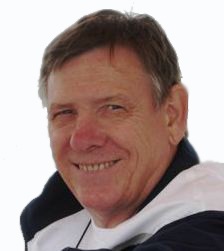
Alan Sharp - Inducted 1996
Alan Sharp was without doubt the pre-eminent administrator for the sport of Rugby Football in Canada during the 1980’s & 90’s. He was influential in the games growth not only in Canada but internationally as well. For thirteen (13) years he was a member of Rugby Canada’s Board of Directors; a member with vision and passion guiding its development. In addition he served for ten (10) years on the International Rugby Board (IRB) as a Council member overseeing the explosive growth of the game worldwide.
Alan was recognized in 1983 with the British Columbia rugby community awarding him the Jack Patterson trophy for his outstanding volunteer contributions, but his colleagues recognized that his involvement and contribution to the game drew him to much wider fields. His leadership, planning and financial acumen firmly established the Canadian Rugby Union at the “head table” of world Rugby. His term in the office saw the rapid expansion of the Game domestically, while his tenure at the International level with the IRB was as equally significant and impressive if not more so and was highlighted with the game:
- Becoming truly established in over one hundred countries and territories
- Transitioning it to include the professional game
- Expanding exponentially in terms of participants and programming/games for Women and Junior’s
- Developing its world Championship (Rugby World Cup) into one of the top four sporting competitions in the world
In the international community he is held in the highest esteem and was honoured at the 2001 IRB Council meeting with a farewell dinner. At this event, Vernon Pugh QC, Chairman of the IRB said, “To all those that had the pleasure of Mr. Sharp’s company over the years he will be sadly missed for his participation, wit, wisdom and astuteness round the Council table. Mr. Sharp has been an outstanding representative of the Canadian Rugby Union and the Game generally….”
He played Flanker for the Vancouver Meraloma’s. Upon retiring from playing, he turned his attention and considerable efforts into administering the game he so loved. Alan sat on many boards/committees over a twenty-seven (27) year period between1974 – 2001.
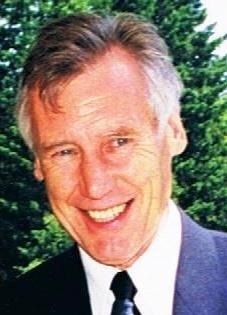
Monty Heald - Inducted 2013
Monty Heald was born in Derby, in the East Midlands region of England. He first became involved in Rugby at Royal Masonic School, Hertfordshire, in 1949 playing for the Colts team. Upon graduation from school, he played for Derby R.F.C. over a fifteen year period. During this period, he also played for Greengarth R.F.C., in Cumberland (1957 - 1959) and Ashbourne R.F.C., in Derbyshire (1959 – 1960). Also, during this period, Monty was selected for and played in every position but hooker and fullback. During his final years with Derby R.F.C., concluding in 1968, he played in what may be a Club record 107 consecutive first grade matches, and was Club captain for two years, 1965/7. Monty immigrated to Burlington, Ontario in 1968 and he moved to Puslinch in 1971. He played for the Hamilton Hornets from 1968 to 1972, and he captained that Club in 1971. The Burlington Centaurs Rugby Club was founded in 1973 and Monty became a founding member and the Club’s first captain. He also served the Burlington Club as its second President, a position he held for four years, and he ultimately became a Life Member of the Club.Monty’s playing career concluded in 1988 and he had already become involved in administration at a number of levels. He served the Niagara Union as the Director of the Senior Team, and he served the Ontario Rugby Union as a selector for two years (1979/80).
In 1981, Heald became a National Selector and he chaired the C.R.U. Selection Committee for the period 1983 to 1994. In 1984 and 1985 he was appointed as the Manager of the Canadian Sevens team which played in the Hong Kong Sevens. Also in 1984, he was appointed as the Manager of the Canadian team and he served in this position for Can-Am matches in Chicago (1984), Tucson (1986) and Seattle (1990). His managerial career was highlighted by the seven match tour to Australia, in June, 1985, in which the Test matches in Sydney and Brisbane represented the first ever meetings between Canada and Australia. Monty was also manager of the first CANZ series (1989) taking the National team to Argentina and New Zealand.
Monty was elected to the Board of Directors of the Canadian Rugby Union in 1986 and he served as Director of The National Team for the period 1986 – 1991. He was elected as President in 1991 and he served in this capacity for eight years. In 1995 PARA was formed 1995 and Monty served as the Canadian Rugby Union representative including two years as President. The National Union underwent many significant structural changes over Heald’s term of office and, as well, there were many major challenges facing the administration, including Marketing and Communications, the tremendous growth in the number of domestic players, and the growth of the Women’s game, both domestically and internationally. In the middle of Monty’s leadership, the Union effected a major change, that being the change in name to Rugby Canada. The National Union, through the services of Alan Sharp, our representative on the Council of the International Rugby Board, became significantly more involved in the activities and programs of the I.R.B.
The number of international fixtures involving Canada increased by 160% over the period 1990 to 1999, and Canada prepared for and participated in three Rugby World Cups, in 1991, 1995 and 1999. Monty’s concluding term, as a Director, in 2000 brought his total years of service to the National Union up to twenty. He was inducted into the Ontario Rugby Union Hall of Fame in 2004. He is now retired and lives in Waterdown, Ontario, and is still involved in Rugby, coaching at the Waterdown High School and serving as Chair of the Past Presidents committee, Chair of the Hall of Fame committee and member of the Annual Awards Committee of Rugby Canada.
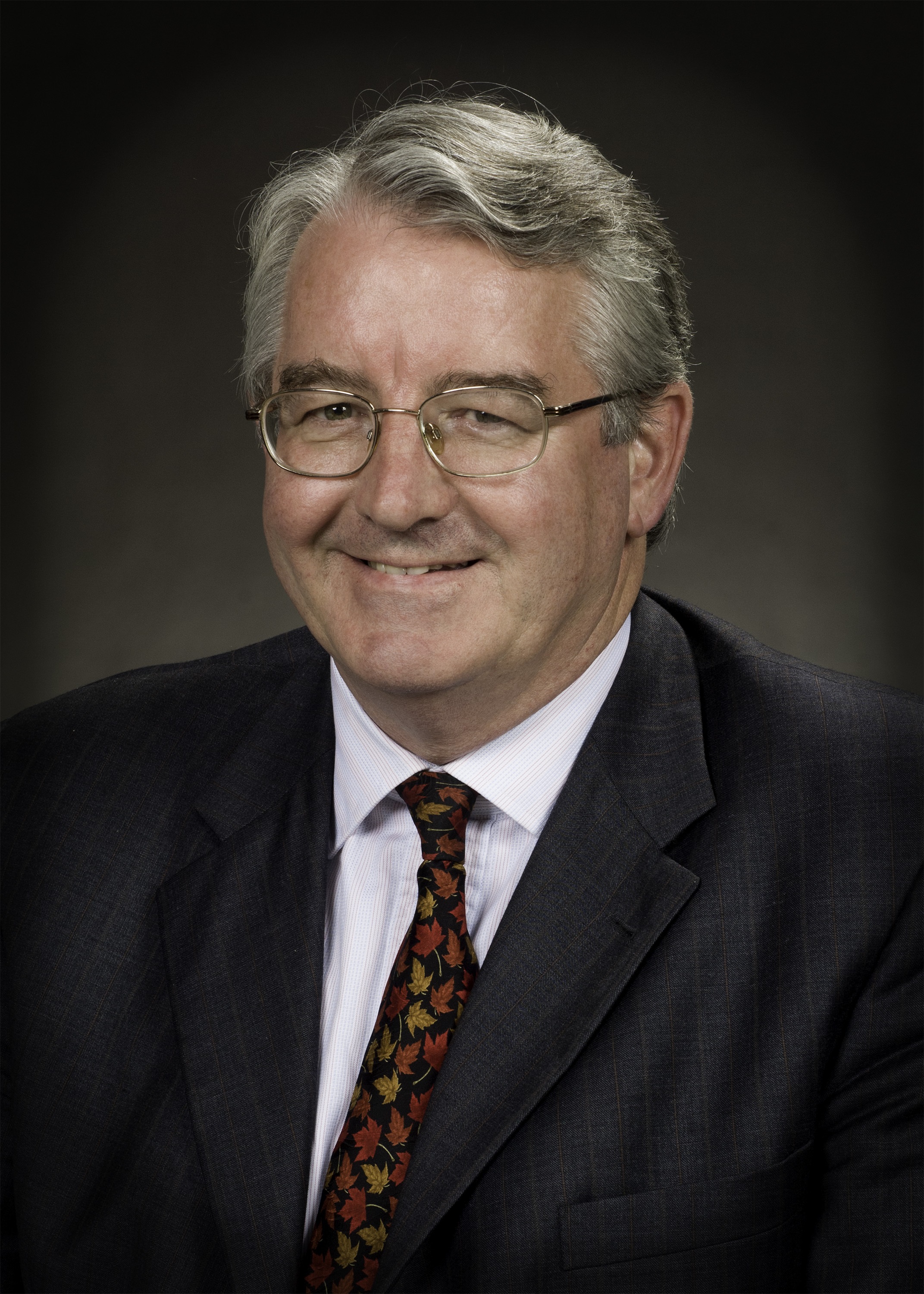
Dr. Pat Parfrey - Inducted 2015
Pat Parfrey’s name is synonymous with rugby in Newfoundland and Labrador (where the local press have dubbed him Dr. Rugby), across Canada and around the world. For over 30 years Pat has given his all to Canadian rugby from the development of the game, to the coaching of players, to becoming one of the sport’s most prolific fundraisers and builders. Pat has raised millions of dollars for rugby which has led to the building of world class facilities, the training of countless athletes and the global pursuit of top flight competition. He is the only person to have served as Coach of Canada’s National Senior Men’s Team and President of Rugby Canada and is currently Canada’s representative on the World Rugby Board.
Pat’s long list of achievements for rugby are equally matched with his academic and professional accomplishments. An internationally renowned scientist and clinical epidemiologist, he has been named a Fellow of the Royal Society of Canada and an Officer of the Order of Canada among other distinguished awards.
Pat started playing rugby at the age of 13 in his native Cork, Ireland progressing to the University College Cork RFC while studying for his medical degree. He went on to represent the Province of Munster, playing in all its games from 1970-77 and highlighted by the 1973 match when Munster drew 3-3 with the New Zealand All Blacks. He claimed his Ireland cap, again versus New Zealand, in 1974. Incidentally his only memento of the match was a pair of All Black socks (which were unwittingly used by the author of this biography to clean stain brushes when Pat hired some players to update his house one summer for tour credits!)
To further his academic career Pat moved to England and played with the London Irish from 1976-1981 assuming the responsibility of player coach from 1977-1982 guiding the team to its first ever RFU Cup Final in 1980. He arrived in Canada in 1982 to work at the Royal Victoria Hospital in Montreal and then moved to Memorial University of Newfoundland to become an assistant professor of Medicine.
Head of his department he now holds the position of Professor of Medicine (Nephrology) and continues his ground breaking research in genetic and epidemiology of inherited diseases, nephrology and healthcare delivery systems.
With limited financial and player resources Pat single handedly transformed how we played rugby and where we played the game. His ability to inspire and motivate were not confined to the pitch as he reached out to the business community and government to help finance and realize his vision of creating a world class rugby facility in the centre of St. John’s. Soon we were welcoming competitive teams from all corners of the globe and embarking on regular tours ourselves. These were not social trips but tours that tested our developing abilities against stiff opposition. Under his direction this group of ‘bog’ rugby players would rise to become national contenders. His steadfast belief that players can only improve by playing better opposition and that you can achieve greatness if you reach beyond what you think you are capable of has served us well.
Having placed Newfoundland on the Canadian rugby map he soon set his sights on increasing Rugby Canada’s position on the global scale. From his impressive player/coaching days at London Irish, guiding Canada’s national team in the late 1990’s, and winning four national titles with the Newfoundland/Atlantic Rock, he has displayed his incredible ability to mould winning teams from scarce resources. He has led two of Canada’s historic clubs; the Montreal Irish and Swilers RFC to cup winning success. Pat has mentored and coached athletes of all ages in numerous Canada Games, National Festivals, the Canadian Rugby Championship, its precursor the Super League and even prior to that the Tier 1 and Tier 2 National Championships. Even today he finds time to guide the Atlantic Rock’s senior men’s team and various age grade sides. His voice has been heard motivating and inspiring thousands of Canadian rugby players. In fact his voice has been heard by tens of thousands of rugby fans around the globe! Prior to guiding Canada’s team at the 1999 World Cup, Pat coached the Canadian team against Ireland at Lansdowne Road before 20,000 fans. Hearing him ‘coaching’ the players from the upper stands will be a memory not soon forgotten. His love of the game and the players he coached is best summed up from a response Pat gave to a reporter who asked how it felt to coach the Canada team in RWC 1999 - “It was a pleasure to coach Canadians who are tough, proud and great friends”. Not only did he teach his players how to be better at the game of rugby, we came to hold ourselves to a higher standard and became lifelong friends through the process.
Although his coaching success may be his most visible work, it is the behind the scenes planning, goal setting, lobbying, fundraising, orchestrating, and ultimately getting things done on the grandest of scale that will trump his many achievements. He is acknowledged as an intellect that combines his own resources with his innate ability to organize and harvest other resources to achieve results for the betterment of our society and in particular our youth.
Away from the field the Parfrey home is legendary for its rugby hospitality. Pat along with his late wife Dr. Benvon Parfrey, a recipient herself of Rugby Canada’s Chairman’s Award, have hosted and seemingly housed the planet in the spirit of the game. They also managed to raise four fine men, all of whom have played rugby at the top level including two who have been capped by Canada. It is a family that lives and breathes rugby.
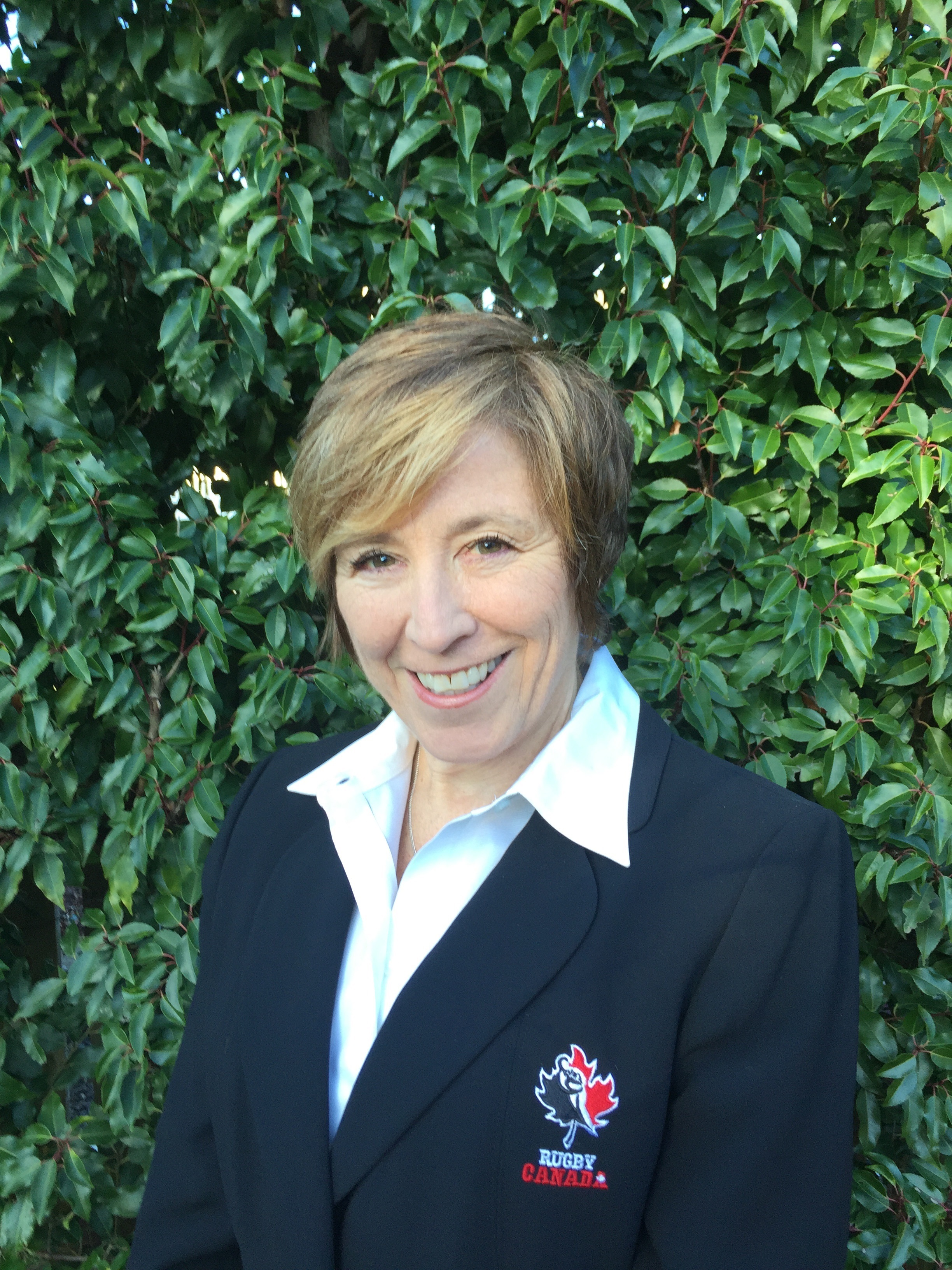
Stephanie White de Goede - Inducted 2016
Stephanie’s involvement in the sport of rugby began in the province of Alberta, but most of her time has been spent in British Columbia and currently calls Victoria her home. As a player, a coach, a volunteer, an administrator and a rugby parent, her contribution to the sport warrants recognition for her multi-faceted contribution over almost 40 years.
The introduction of Women’s rugby into the Canadian Rugby community formally began in the mid 1970s. One of the initiating Provincial unions was the Alberta Rugby Union. The challenge of introducing Women to rugby faced many obstacles, particularly from the traditionalists who didn’t believe the sport could provide benefit to women, or Vice versa.
However, the reality was that a number of women across the country had watched from the sidelines, and they felt that it was a game that they would enjoy. Informal games were undertaken, with the result that a significant number of women within the community decided that they wanted a formal structure within Rugby Canada to allow them to participate with full protection under the ‘Laws of the Game”. Ms. White was one of the women in Alberta that chose to take up the game of rugby starting in 1980. This was the year after three rugby clubs were formed and league play began. While Ms. White was active in the organization of Women’s rugby as part of the formation of the Alberta Women’s Rugby Union in the early 80s, she was also a leader on the field of play.
Ms. White was the first Captain of the Canadian Women's Rugby team. Her play, as well as leadership on the field contributed significantly to the success of the game. Ms. White was active on National Women’s Team activities that led to the preparation for the inaugural Women’s Rugby World Cup. This included two additional Test Matches with the United States in 1988 and 1989. She was then appointed Co-‐Captain of the 1991 World Cup Team. The Canadian team made a strong showing at this First International Tournament, winning the Plate competition. Comments from Administrators involved in the preparation of this team give Ms. White strong recognition for contributing to the preparation and success achieved at this tournament.
The Second Women’s Rugby World Cup was held in 1994. Canada was again represented, and Ms. White was appointed Captain of the team. The growth of Women’s rugby throughout the world was increasing at a positive rate. The result being this second World Cup was given much more credibility, and the established countries started to pour financial and technical resources into their National Women’s teams. Canada did not have the luxury of increasing the resources to any significant extent during this period. To the credit of the team, a 6th place finish was achieved, losing in the Plate competition in the final game.
In an effort to provide more, and better competition for our National Women’s team, Rugby Canada initiated the Canada Cup competition. This competition involved inviting three (3) National teams from other countries to play in the tournament in Canada. Ms. White participated in these two competitions, again providing on the field leadership. In 1997 Canada sent their first National Women’s team to the Hong Kong Sevens tournament. Ms. White had the honor of Captaining this side.
One of the first competitions held at an interprovincial level was the Western Canada Women’s Championships initially held in 1983. This tournament was held each year between 1983 and 1987. Ms. White played on the Alberta team in each of these years contributing to the Alberta team being Western Canadian Champions for the four-year period 1983-1987.
In summary, Ms. White retired from Representative Rugby in 1997. Over her playing career she earned 17 National Team caps in the 10 years she played at the international level.
Players lead the team, but also the community, in the growth of Rugby in Canada. Women’s rugby has been blessed with a leadership core of women who were determined to develop the game of rugby for women in Canada. Ms. White was part of that leadership group. She worked hard to support opportunities for Women’s rugby in Canada to grow. A brief synopsis of this very important part of developing the playing of rugby by women within the rugby community is as follows
Administrative roles:
- Helped establish the Alberta Women’s Rugby Union, and assisted the inclusion of Women’s rugby in the Alberta Rugby Union.
- Was the Director of Women’s Rugby, as a member of the Board of Rugby Alberta in the late 1980’s
- In 1995, she was the Women’s Players representative at the Rugby Canada Strategic Planning session
- In the early 2000’s Ms. White was a member of the B.C. Rugby Union Board of Directors and helped bring the West Coast Women’s Rugby Association into the BCRU
- During the period 2007-‐2013, Ms. White was a Board member of Rugby Canada, as well as a committee member on the National Women’s High Performance Committee
Coaching roles:
- 1998 Assisted with the Comox Kickers women as well as helping with the high school team in Courtney
- 2002‐2004 – coached the James Bay Athletic Association women’s team
Currently, Ms. White is the Chair of the Monty Heald National Women’s Team Fund, raising funds to ensure that the 2017 National team players are not required to pay to be a part of Rugby Canada’s Women’s Rugby World Cup Squad and to create a legacy for future years.
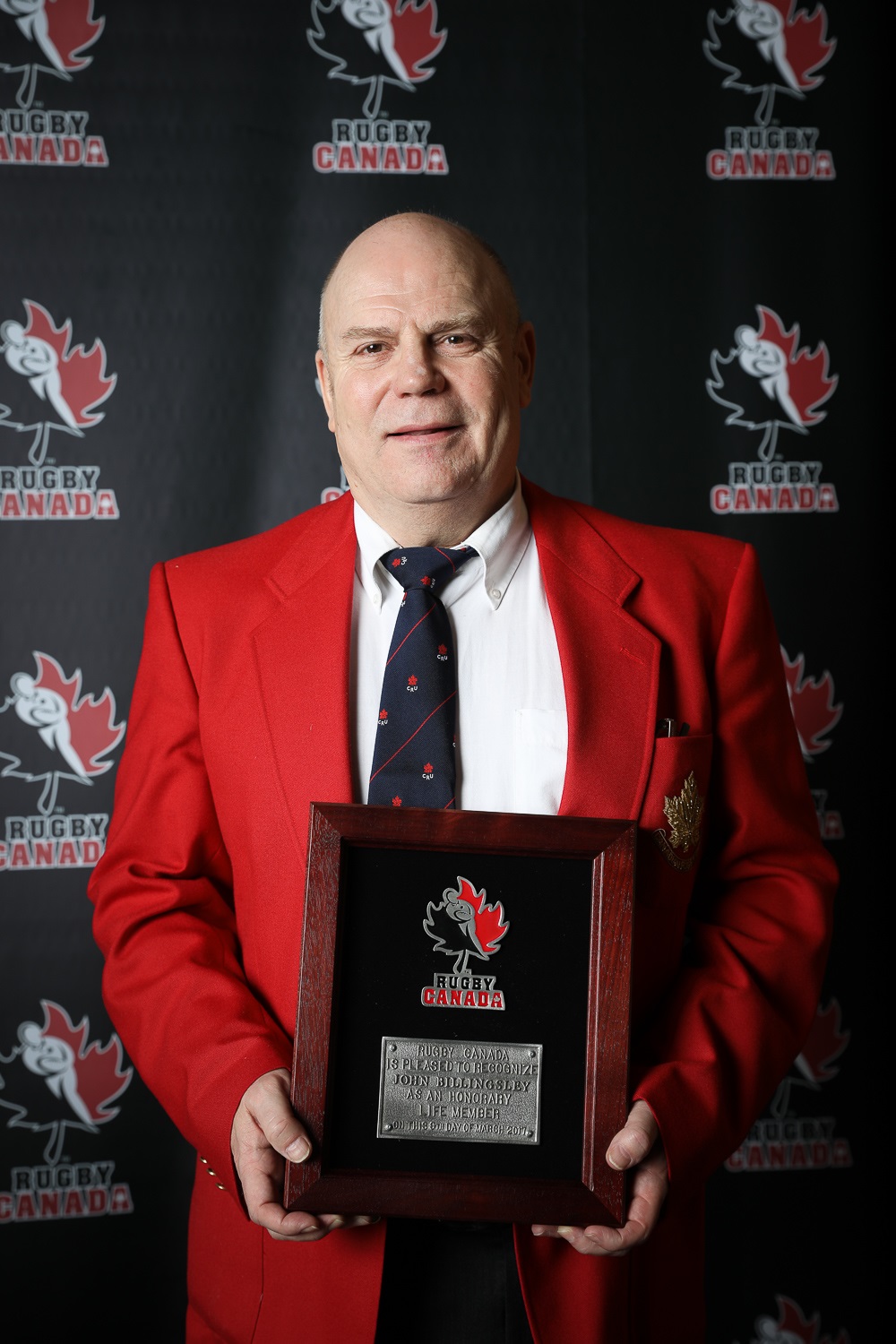
John Billingsley - Inducted 2016
John Billingsley was born in Vancouver, BC where he began his rugby at Magee High School. He played rugby on the Vancouver Meralomas in 1972 & 1973 where the team won back to back BC Club Championships and then went to University of British Columbia and played from 1974-1977 while earning his Bachelor’s degree in Physical Education and a minor in Commerce and Business. John also attended California State University at Long Beach and played for the University team while earning his Masters degree in Sports Administration.
In 1981, John relocated to Ontario to take the position of Executive Director/Chief Operating Officer for the Canadian Rugby Union where he was a senior staff member for 20 years. At its peak, he managed a staff of 8 employees with an operating budget of $5 million, and stayed with the organization through 2001. Following his success at Rugby Canada, he went to the Canadian Soccer Association (CSA) where he was Deputy Chief Operating Officer/Chief Operating Officer for 6 years.
After his departure from the CSA, John continued to work as a Sport Management Consultant for the CSA and Rugby Canada. His role as a consultant with Rugby Canada came as the organization began hosting more home international test matches as awareness and support for the sport grew and rugby went from being held on local club/university fields to large stadiums where over 20,000 fans could assemble in one location to cheer on Canada men’s and women’s teams.
Beginning during his University years, John played rugby for Canada internationally for ten years (1974-1984), earning 9 caps. His first was earned at the age of 20 against Tonga and his last cap at age 30 against the USA. He also played on Canada’s Sevens team in 1981 and 1983 at the Hong Kong Sevens.
He also played competitive rugby at the Provincial level for 8 years with the BC Rep Team and 2 years with the Ontario Rep Team. During this time he also played competitive rugby at the Club level including the Vancouver Meralomas where he won back to back BC Championships in 1972/73; the UBC Thunderbirds, Long Beach State University and the Ottawa Irish who were Ontario Club Champions during his time playing there in 1982/83/84.
John not only played rugby but he went on to fill the role as a coach as well. In 1982-1987 he was a player and coach and from 1988-1995 solely a coach of the Ottawa Irish Sevens team that won several Ontario Sevens Championships. He also refereed rugby for approximately 10 years where he reached the provincial level before retiring in 1999.
John has a wealth of knowledge when it comes to the history of the sport here in Canada and is currently serving on Rugby Canada’s Ways and Means Committee that is charged to help archive our rich rugby history and played a role in inducting our first class of Hall of Fame members in 2017.
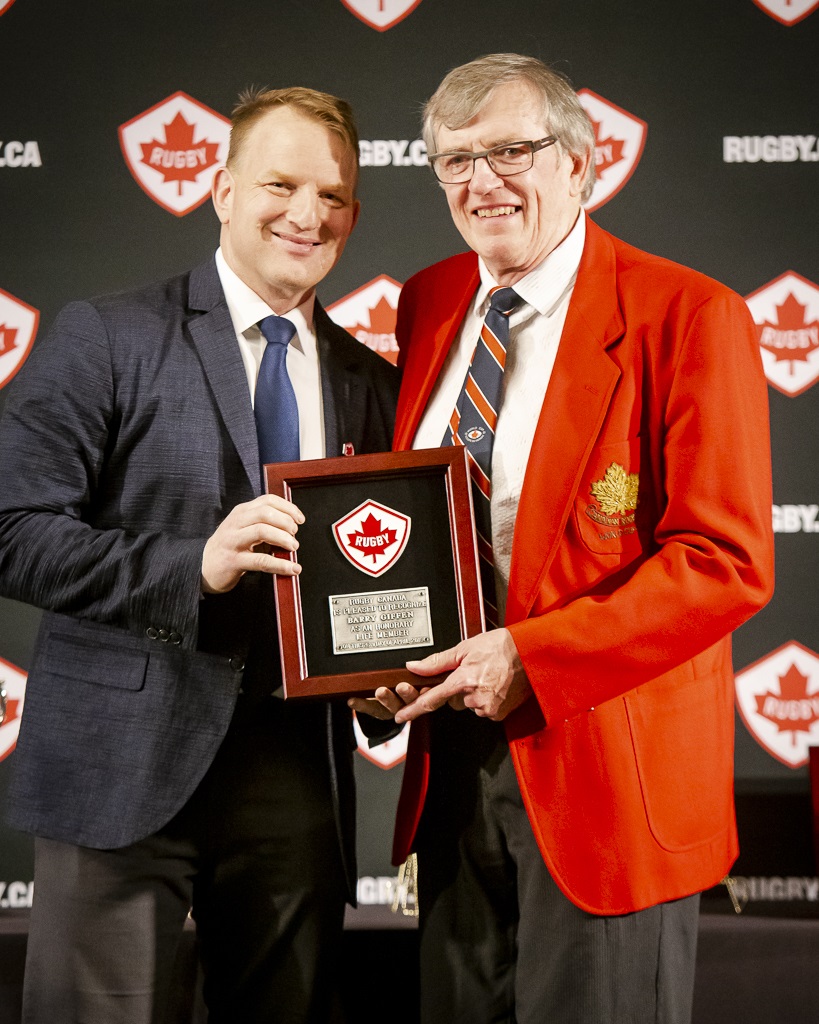
Barry Giffen - Inducted 2018
Barry Giffen was born and raised in Edmonton, making him the first Albertan to be accorded the honor of serving the National Union in the capacity of President.
Barry started playing Rugby, for the Edmonton Druids R.F.C., in 1971 and he played representative Rugby, for Edmonton and Alberta, through the seasons of 1974 to 1977. His playing career concluded in 1981.
He became involved in administration in 1973, being appointed as the Co-chair of the Fundraising Sub-committee of the Ellerslie Development Committee. His pure enjoyment in serving as a volunteer, brought him to being elected as the President of his Club for the period 1976 to 1977, and again in 1980. He, ultimately, was rewarded for his service to the Druids by being made a Life member of the Club. In addition, Barry was also recognized for his contribution to Edmonton Rugby by being inducted into the Edmonton Rugby Union Hall of Fame.Barry branched out into provincial ‘politics’ and, in 1984 he was elected as the President of the Board of the Alberta Rugby Union. He served in this capacity for two terms. While in this position, amongst his other activities, Barry championed the cause of Women’s Rugby, to the extent of being largely the reason for the creation of the Alberta Women’s Rugby section, which provided for substantial development in this area.
Giffen continued to move upward and, after his terms as president of the provincial union, he became involved as Alberta’s representative at the National Union level. He was elected, in 1987, as the President of the Canadian Rugby Union and he served, in this capacity, until 1991.
Barry continued to champion the cause of Women’s Rugby, this time at the national level, and he was instrumental in the creation of the position of Vice-President – Women’s Rugby. Women’s Rugby had been developing, at the Canadian level, through provincial representatives’ meetings, over the four previous years but the 1987/88 period saw the formalization of this development and the election of Liz Ferguson as the inaugural Vice-President.
During the 1991 year, there were many innovative events at the Canadian level, not the least of which was the staging of an International Test match, in May, between Canada and Scotland, with Saint John, New Brunswick being the host venue, and the match being won by the host nation, 24 – 19, a significant achievement. All of preceding efforts contributed to the achievement of Rugby Canada placing 8thin the 1991 World Cup, which was one of his proudest moments.During the period between his formal involvement with the National Union, Barry continued to work to develop the Game at the National level, sharing the responsibility for staging the 1993 Asian and Pacific Congress (with Fred Kazakoff) hosted by Rugby Alberta in Calgary.
Barry was, uniquely, elected for a second term providing leadership for the Canadian Rugby Union in 2000. While the latter stages of this second term was marked by debate and disharmony, Barry worked hard to avoid a lot of the angst in order to accomplish some of the Union’s goals. In the end much success was achieved, or, at least the groundwork undertaken, in the areas of Player Registration and Sport Canada funding, the latter improving substantially.
In recent years, Barry has taken on the Chair of the Rugby Canada Ways and Means Committee, which has been instrumental in the establishment of the Rugby Canada Hall of Fame and the Rugby Canada Museum and Archives in 2017.Barry Giffen, through the philanthropy of his company, Landlink Consulting, continues to this day to make a substantial contribution to the development of Rugby in this country.
-
Rugby Canada Hall of Fame Nomination Process
Process to Nominate an Individual for Hall of Fame Consideration (Approved July 19, 2023):
1) Read Rugby Canada’s Hall of Fame Nomination, Selection and Recognition Process
2) Contact nominee seeking his/her approval to be nominated
3) Complete the Nomination Form
Deadline for Class of 2024 Nominations is September 30th, 2024
-
Hall of Fame Inductees: 2022 - 2023
CLASS OF 2023
KEITH WILKINSON – BUILDER
An accomplished coach and manager, Keith Wilkinson has served in various roles important to the growth and development of rugby in Canada at the international level. In 1989, he established the Rugby Canada Medical Science Committee along with Dr. P. Wiley. From 1991 to 1997, he served on the Rugby Canada board as National Teams Director, presenting papers and attending conferences in this role around the world in Argentina, the UK, France and South Africa, and attending the 1995 Rugby World Cup.
RICK BOURNE – BUILDER
Bourne has held several positions at the national and international levels, serving on Rugby Canada’s Board of Directors from 2003 to 2019, including five years as President. He was Canada’s Rugby Americas North representative from 2012 to 2019 and currently holds an active position on the board of HSBC Vancouver Sevens as well as director roles with the Canadian Rugby Foundation and the Canadian Rugby 7s Fund. Rick is also a long-time Contributing Member to the Canadian Rugby Foundation Contributing Member.
SHERRY TRUMBULL – MATCH OFFICIAL
During her career as an international match official, Sherry Trumbull was awarded 40 international refereeing appointments in the 15s game spanning from 2009-2016. Highlights from her career include officiating at the Women’s Six Nations from 2012-2016 and the Rugby World Cups in 2010 and 2014 where she took charge of the bronze medal Final.
ANDREA BURK – PLAYER
Born and raised in North Vancouver, BC, Andrea Burk represented Canada at the 2014 and 2017 Rugby World Cups and was part of the Canadian side that earned a silver medal in 2014, facing England in the final after a historic semi-final win over France. Burk earned a total of 38 caps throughout her international playing career, scoring eight tries, 37 conversions, and 15 penalty kicks for a total of 159 points.
JEN KISH – PLAYER
From Edmonton, Alberta, Jen Kish’s legacy makes her one of Canada’s most decorated rugby players. Kish captained Canada’s Women’s Sevens Team to a bronze medal at the 2016 Olympic Games in Rio de Janeiro, the inaugural Olympic rugby sevens tournament. Over her career, Kish made a total of 134 appearances in the World Rugby Sevens Series from 2013 to 2018, scoring 34 tries for 170 points.
JULIANNE ZUSSMAN – PLAYER
As an international rugby player, Julianne Zussman earned a total of 44 caps over the span of her career, scoring a total of 18 tries, often running in the back three. She earned her first cap against Scotland in 2007 and played for Canada at the 2010, 2014 and 2017 Rugby World Cups, claiming a silver medal in 2014. she was named to the 2017 World Rugby Dream Team and was named the recipient of Rugby Canada’s Gillian Florence Award, a peer selected award given to the player who “best represents the qualities of Canadian rugby”.
MARK CARDINAL – PLAYER
Mark Cardinal played with the James Bay AA Rugby Club after graduating high school in 1979 until he hung up his boots in 1999. Cardinal’s career with Canada on the international stage was highlighted by three Rugby World Cup appearances in 1987, 1995 and 1999. During his time representing Canada, Mark earned a total of 46 caps, starting in 35 of the test matches he played.
MIKE JAMES – PLAYER
Mike James’ illustrious rugby career began at Burnaby’s Alpha Secondary School, where he started playing rugby in grade 11. Shortly after his international debut in 1994, James was named to his first Rugby World Cup. He went on to earn 57 caps all as starter, over 1994 to 2007 as Canada’s most-capped second row, playing in four Rugby World Cups (1995, 1999, 2003, 2007) and captaining the team four times between 2003 to 2007.
STEVE GRAY – PLAYER
Steve Gray earned 47 caps for Canada between 1984 to 1997, including famous Canadian wins against the likes of Scotland, Wales, England, Argentina and France. In 1987, Gray scored three tries in a test match against the United States. He played in three Rugby World Cups (1987, 1991, 1995) and was selected to Canada’s Men’s Sevens Team on multiple occasions, including the squad for the inaugural Rugby World Cup Sevens in 1993.
CLASS OF 2022
George Gadjovich – Builder
Canada’s premier referee in the 1990s, George Gadjovich officiated over 1000 club, regional, provincial, national and international matches over an almost 20 year career. From 1991 to 1997 he refereed 14 international matches and three A/B international matches, including the Plate Final at the 1992 Hong Kong Sevens and the Bowl Final at the inaugural Rugby Cup Sevens in 1993.
Davie Graham – Builder
Also known as “McScrum”, Davie Graham was the owner and operator of the National Rugby Post, a newspaper distributed across Canada for 22 years that played an important role in improving communication and the exchange of information within the Canadian rugby community. Graham also played a role in establishing a number of rugby clubs in Alberta.
Gord MacKinnon – Player
Gord MacKinnon played for Canada’s Men’s Rugby Team from 1985 to 1995, competing in two Rugby World Cups and retiring with 28 caps. During his career he also played in various sevens tournaments, including the 1993 Rugby World Cup Sevens and the 1997 Rugby World Cup Sevens Qualifier.
Kelly McCallum – Player
A 16-time captain for Canada, Kelly McCallum was starting flyhalf at the 2002 and 2006 Rugby World Cups. The first-ever winner of the BCRU Women’s Player of the Year award, McCallum scored 100 points for Canada over her career. Rugby took her around the world, and she has played and/or coached in England, Australia, Japan and New Zealand.
Kelly Russell – Player
One of Canada’s most capped women’s rugby players, Kelly Russell earned 53 caps with Canada’s Women’s Rugby Team over 11 years, captaining the team 34 times, scoring 60 points, and representing Canada at three Rugby World Cups (winning silver in 2014). She also had a storied career in the sevens game, winning Rugby World Cup Sevens silver in 2013, Pan American Games gold in 2015 and Olympic bronze in 2016.
Ryan Smith – Player
Selected to the 2003 Rugby World Cup roster in his first season with Canada’s Men’s Rugby Team, Ryan Smith went on to accumulate 51 international caps and compete at three Rugby World Cups. His success on the national team translated into professional contracts in New Zealand and in France. After retiring from playing, he played a pivotal leadership role with the Prairie Wolf Pack.
Sherri Sparling – Player
A natural athlete, Sherri Sparling earned her first cap for Canada just five years after starting the sport at the 1998 Rugby World Cup. She earned 19 caps, serving as captain for Canada’s Women’s Rugby Team’s first World Rugby win against the United States on home soil and at the 2002 Rugby World Cup.
1991 Men’s Rugby World Cup Team
Between 1989 and 1996, Canada’s Men’s Rugby Team won numerous international games, but it was at the 1991 Rugby World Cup in France that global recognition of and respect for Canada as a rugby nation was garnered. After wins over Fiji and Romania and a close loss to France, Canada met New Zealand in the quarter final. Despite a final loss of 29-13, the team had proven that Canada had become competitive within the uppermost level of international competition and put Canada on the rugby map.
-
Hall of Fame Inductees: 2016 - 2021
2016 - 2021
J. Barrie Burnham
Burnham was British Columbia and Canada’s premier fullback and goal kicker for a decade. Canada only had six international matches between 1962 and 1971 and Burnham appeared in four of them. Of the 35 points Canada scored in those games, Burnham kicked 15. During this period, Burnham played for Canada & BC, against New Zealand, Australia, England, Japan, the British Lions and the Barbarians
Ted Hunt
Hunt was an extraordinary player for his high school, university, club, sub-union, provincial union and country at a time (1950’s & 1960’s) when there were very few Rugby Canada teams to play international matches. He played rugby at the top level for two decades, competing nationally and internationally, often as captain. During the period of 1957- 1967, Hunt played and (in most) captained Canada & BC, against New Zealand, Australia, Japan, British Lions, England and the Barbarians.
Click Here For Full Bio
Mandy MarchakMandy Marchak played a prominent role in Rugby Canada’s fifteens and sevens programs during her career. Marchak began playing in Manitoba and was inducted into the Manitoba Rugby Hall of Fame in 2017 following an outstanding career. She moved from Winnipeg to British Columbia to play with Capilano in 2004, and in 2009 she was named BC Premier Player of the Year. Marchak competed for historic club Saracens RFC for three seasons and represented both Canada’s U-19 and U-23 fifteens sides. She was selected to Canada’s World Cup roster in 2006 and competed in a total of three World Cups, capturing a silver medal in 2014. Marchak also competed with the women’s Sevens program in 2007 and went to the first Sevens World Cup in 2009.
Heather Moyse
Heather Moyse is widely considered as one of the best fullbacks in the game and was inducted into the World Rugby Hall of Fame in 2016. She is one of only six women overall and one of only three Canadians to have received this honour in addition to being one of Canada’s all-time top multi-sport athletes. Moyse led try-scoring at two Rugby World Cups in 2006 and 2010. She captured the silver medal at the Rugby Sevens World Cup, played in 22 international 15’s matches, and appeared in five 7s tournaments for Canada and was She was named to the All-Canadian, Canadian Interuniversity Sport (now U SPORTS) team on three occasions.Jill Zonneveld
Jill Zonneveld has held a presence in the development of the game of rugby at the national, regional and international levels of the sport. During her tenure as VP, Canada’s National Women’s Team, Zonneveld was instrumental in furthering competition for women and Canada with the introduction of the Canada Cup, improved funding for national team players, increased international fixtures and increasing the number of teams in attendance at the WRWC.
Click Here For Full Bio
R.P. “Bobby” RossR.P. “Bobby” Ross entered the rugby world as a student at Victoria’s St. Michaels School, and by the time he retired in 2003, he had received 57 caps, kicked 421 points, and played in three Rugby World Cups, a qualifier match, the Pacific Rim and Pan American Series and the inaugural Churchill Cup in 2003. His 14-year career total of 421 points places him third overall in points standings. With his value extending far beyond just points and appearances, Ross is remembered as a respected leader and one of BC’s finest players.
2016 Women’s Olympic Sevens TeamSelected to this year’s Hall of Fame inductee list is the 2016 Women’s Olympic Team, winners of the Rio 2016 Olympic Bronze medal in Women’s Rugby Sevens competition. The Women’s Sevens team joined the Canada’s women’s soccer team as the only team sport medalists for Canada since 1936. The team’s success spurred Rugby Canada’s programs to new heights and had an immediate impact on participation and funding for the sport in Canada.
Click Here For Full Bio
20202014 Women's Rugby World Cup Team
The 2014 Women’s Rugby World Cup Team delivered breakout performances in the lead up to and during the 2014 Women’s Rugby World Cup in France. This historic group of elite athletes turned in a magical performance in 2014 making it all the way to the Final to be narrowly defeated by England. Their 2nd place finish is highest Rugby World Cup finish of any Canadian side. Additionally, six players were named to the 2014 Women’s Rugby World Cup “Dream Team” as voted by fans from around the globe and following the final, Magali Harvey was named the 2014 IRB Women’s Rugby Player of the Year.
The road to the final game in the 2014 Women’s Rugby World Cup (WRWC) included many remarkable elements, none of which could have coalesced without the combined talent and commitments of the players, coaches, and provincial unions.
Preparations for the 2014 Rugby World Cup included two Nations Cup competitions held in North America in 2011 and 2013, during which the Canadian squad recorded its first and second-ever victories over England.
During the 2014 WRWC pool rounds, having defeated Spain (31-5) and Samoa (42-7), Canada tied England in its third pool round game. This put Canada ahead of New Zealand in the tally of competition points and sent the Canadian squad to the semi-finals.
Canada met France in the semi-final match in front of 20,000 French supporters walking away with a narrow win (18-16) earning a spot in the final. Canada would conclude its historic run with a hard fought 21-9 loss to England. Nevertheless, the team managed to raise the bar to a level never before reached by a Canadian National Rugby team. In doing so, they captured the hearts and inspired the entire rugby community and sports fans across Canada.
Canada’s 2014 Women’s Rugby World Cup Team:
Kim Donaldson, Mary Jane Kirby, Olivia DeMerchant, Hilary Leith, Marie-Pier Pinault-Reid, Laura Russell, Tyson Beukeboom, Latoya Blackwood, Kayla Mack, Maria Samson, Barbara Mervin, Jacey Murphy, Karen Paquin, Kelly Russell, Stephanie Bernier, Julia Sugawara, Emily Belchos, Julianne Zussman, Andrea Burk, Mandy Marchuk, Amanda Thornborough, Brittany Benn, Jessica Dovanne, Magali Harvey, Brittany Waters, and Elissa Alarie.Leslie Cripps
Leslie Cripps made forty-seven international appearances representing Rugby Canada, and dutifully served as captain on twenty (2007-2010) occasions. A national team representative for a decade, Leslie represented Canada at the 2002, 2006, and 2010 Women's Rugby World Cup’s.
Leslie was first introduced to rugby at Williams Lake Rugby Club in 1996 at the age of 18. In the early years of her career Leslie played club rugby with UVic Valkaries, which became UVic Vikes, then Velox and onto James Bay AA in Victoria, BC. She would go on to join Saracens in London, England in 2001, making an immediate impact and winning the “New Player of the Year” award. Over a long career with Sarries’ Leslie spent two seasons as captain and help win the league title five times.
In 2000, she played for Canada’s U23 team against the USA and claimed her first cap for the senior side the following year when Canada took-on our neighbours in Saranac Lake. Leslie’s competitive relationship with USA came full circle during her final game on the international pitch when Canada played against the familiar rival in Surrey, England at the 2010 WRWC.
Leslie’s international honours include being involved in the World 15s Team in 2003, playing the world Champions, NZ, in two test matches. She also captained the Nomads - the select Barbarian side - in 2008 in a curtain raiser to the Men's South Africa vs New Zealand fixture, and a celebration of Nelson Mandela's 90th birthday.
She was a great leader on and off the pitch and her impactful presence as an international prop in the scrum and in open play made her a threat for opponents to contend with.
Leslie was inducted into the BC Rugby Hall of Fame in 2019.
Josée Lacasse
Josée Lacasse began playing for Canada’s Women’s Rugby Team in 1992 at the age of 22 as a prop forward, and subsequently represented Canada in three Women’s Rugby World Cup’s in 1994, 1998, and 2002. One of the key leaders on the national team, she was the epitome of a team-first mindset. Josée retired in 2002 with 29 caps, which was the most of any Canadian woman to that point.
Josée first played for the Stingers at Concordia University, where she completed a Bachelor's of Science, and was a key player in their great successes in the early 90’s. She was named fittest athlete in 1992-1993 and received the Academic Athlete of the Year award in 1991-1992. In 1993, she was a finalist for Concordia Athlete of the year, and she holds the distinction of being the first female rugby player inducted into the Concordia Sports Hall of Fame. In her last two years, Josee was Concordia's captain and Most Valuable Player.
In 1998, Josée became the first Canadian woman and only the second North American player selected to the All-World team playing against the Black Ferns following the Women’s Rugby World Cup in Amsterdam.
As a member of Ste-Anne-de-Bellevue RFC, Josée was part of an amazing era for the club having an undefeated season and a five-year winning season streak in the early 1990’s.
In addition, Josée was a valued member of both BC and Quebec provincial teams. She was a member of the BC team which won two National Championship including a 1995 victory in which she was captain.
Since retiring from playing in 2002, Josée continues to give back to the game and the rugby community. In 2002, she was a Championship winning head coach in 2002 with the Concordia Stingers and the Ste-Anne-de-Bellevue RFC Women's Premiére team. On any Monday night in the Spring, Summer and Fall, Josée can easily be found at rugby fields in Ste-Anne's coaching youth rugby teams in the local Saints rugby program. She continues to support club fundraising initiatives, and proudly performs community volunteer work such as sandbagging against floods and helping at the local foodbank.Moira Shiels
Moira Shiels’ rugby journey began with the Ajax Wanderers Rugby Club in Ontario, initially with sevens in 1987 and fifteens the following year helping Ajax win 5 Provincial championships. In Vancouver, Moira was a member of the Brit Lions Rugby Club winning 3 Provincial championships in BC. She would return to Ontario and join the Toronto Scottish RFC in 2001.
At the Provincial level, Moira was a member of both the Ontario Senior Women’s and the BC Senior Women’s teams. She would win 3 National championships with Ontario and 1 National championship with BC.
Moira debuted for Canada’s National Senior Women’s team in 1996 against New Zealand. She would go on to make 25 appearances at hooker for Canada and served as captain on 11 occasions. A natural leader who’s work-rate and dedication was second to none as exemplified by her kicking accuracy. Moira was a stand-out for Canada in two Women’s Rugby World Cups in 1998 when Canada were ranked #8 and again in 2002 when the team had moved up to a #4 ranking. Moira also represented Canada at the Hong Kong Sevens tournament in 1997.
Moira’s achievements on the field are matched in her profession life as a Firefighter serving her community of Richmond Hill, Ontario. In the year 2000 she stepped away from Rugby for one year to finish her Firefighter training and is now in her 19th year as a Firefighter. She was promoted to Acting Captain in 2012 and promoted to Captain in 2019 making her the first female Captain in the history of the department.
For over 30 years Moira has been involved in rugby from playing-to-coaching and more recently supporting Canada’s Women’s Rugby Team following them in their travels to Ireland in the 2017 Women’s Rugby World Cup. Rugby is truly a big part of her life and her intensity and impact on the field are hard to match.Winston Stanley
Winston Stanley began his rugby journey in Victoria, BC at Oak Bay Secondary School under former Canada head coach Gary Johnston. He would go on to play for James Bay AA, University of BC, Kats RFC, British Columbia, and Canada’s Men’s Rugby Team.
Winston’s international debut for Canada came in 1994 as a 19-year-old in both Sevens and Fifteens, a feat no Canadian player had accomplished to that point. He played one match for Canada in the Hong Kong Sevens in March 1994 and earned his first Fifteens cap against the United States in May. He would represent British Columbia in the 1994 Labatt Award game against Ontario, against the New Zealand Divisional XV in 1995, and in the 1995 and 1998 Canadian Rugby Championships.
From 1994 to 2002, Winston represented Canada in Sevens competing in Hong Kong, Taipei, Fiji, Dubai, South Africa, Ponta del Este, Mar del Planta, Wellington, Japan, Beijing and Malaysia as well as the Rugby World Cup Sevens (1997, 2001) and Commonwealth Games (1998, 2002).
Winston’s world-class pace and ball-handling skills at wing, center and fullback made him a premier player for Canada throughout his international career. He would play in three Rugby World Cups in 1995, 1999 and 2003. By the time he retired following the 2003 RWC, Winston had earned 66 caps in Fifteens and was Canada’s leading try-scorer with 24.
Overseas, Winston played professionally for Blackheath Rugby, Leicester Tigers, Worcester Warriors and Leeds Tykes. In the 2000-2001 season, he helped Leicester win the English Premiership title and the Heineken Cup (European Championship) with Winston playing in both the semi-final and the final.
Following his playing career Winston remained involved with rugby in the community as a coach. He was inducted into the BC Rugby Hall of Fame in 2018.2019
John Graf
John Graf showed national team promise from the moment he first wore a St. Michael’s University School jersey in Victoria, BC. Throughout his playing career his raw skill and charisma served him as a player and captain, from age grade to international.
Having represented Canada at the Under-19 and Under-21 levels, Graf earned his first cap as a 19-year-old against Ireland in 1989. He won 54 caps from then through to 1999 and scored 9 tries, 8 converts, 9 penalty goals, and 1 drop goal, totaling 90 points. His talent and versatility propelled Graf to appear in three Rugby World Cups (1991, 1995 and 1999), remarkably being capped at four positions: wing, center, fly half and scrum-half. Graf possessed exceptional leadership qualities, Captaining the Canadian squad in 20 of his 54 appearances. He was known for his lethal spiral kicks with either foot, dead accuracy to slot both penalty goals and drop goals. Graf was the first person to receive 50 caps and became the most capped rugby player in Canada in a match versus Western Samoa in 1999.
From 1991 to 1999 he proved his worth as a valuable Sevens player in about 20-25 tournaments, including as Captain for the inaugural 1993 Rugby World Cup of Sevens.
With his incredible will to win, Graf was a threat whenever he laced on his boots. Even in his time playing time post-national team he continued to demonstrate for UBC Old Boys all the skills and knowledge of an international player.
John Graf was also inducted into the BC Rugby Hall of Fame in 2009.
Dave Lougheed – Player
Upon making his debut for Canada in 1990 versus Argentina, Dave Lougheed would launch a career that would see him become one of our country’s most recognizable players domestically and abroad, a champion and promoter of the game and generous philanthropist.
In a time of far fewer international opportunities for Canadians, Lougheed collected 34 caps for Canada, which included four Rugby World Cups – France 1991, South Africa 1995, Wales 1999 and Australia 2003. Professionally, he was selected as a touring player with the British Barbarians in 1995 before enjoying a professional playing career with the English Premiership’s Leicester Tigers. Lougheed played 55 matches for Leicester where he not only led the team in tries but also to two Premiership titles. He was widely loved and admired by the Tiger faithful for his crushing tackling and hard running, and is regarded as the first prototypical big-man wing commonly seen in today’s game. Lougheed retired from the Tigers in 2000 and returned home to Canada to further his education and raise a family. He continued to play for Canada until his retirement after the 2003 Rugby World Cup.
Following his playing career, Dave has contributed to the pursuit of rugby in Canada at numerous levels. Driven by fond memories from his time at Queens University, Lougheed started the rugby program at the University of Calgary in 2001, where he served as the first Head Coach. After serving as Director of the Board of Rugby Canada from 2008 to 2012, Lougheed founded the For the Love of the Game charitable fund in 2015 – providing grants and scholarships to young elite athletes from across the country so that they may participate in experiences that will allow them to reach their athletic potential.
Dave now runs Lougheed Wealth Management and calls Calgary his home with his Wife Dana and daughters Tatum and Taylor. He was inducted into the Ontario Rugby Hall of Fame in 2015.
Maureen MacMahon – Player
A powerhouse on the field, strong leader in the community and inspiration to younger generations, women’s rugby pioneer Maureen “Mo” MacMahon exemplifies the Canadian rugby athlete.
In her playing career, MacMahon represented both Ontario and Quebec at the provincial level before earning 39 caps for Canada, including competing at the 1998, 2002 and 2006 Rugby World Cups. A flanker and number 8 with a laudable work-rate in the set piece, rucks and mauls, Maureen’s selfless play allowed her teammates to rack up points. Her mere five points scored during her time on the national team is a testament to her work ethic and team-centric philosophy. Believing that a team is only as strong as their weakest member, Mo was always the first to welcome new players and took the time to mentor younger athletes.
Earning a Bachelor of Science in Physical Therapy at McGill University and a Graduate Certificate in Rehabilitation Sciences at the University of British Columbia, the Physiotherapist and neurological rehabilitation specialist continues to give back to the rugby community, coaching at many levels including the Toronto Scottish, Montreal Barbarians and Montreal Irish. Maureen currently teaches physiotherapy technology at Dawson College in Montreal.
Dr. Natascha Wesch – Player & Coach
A talented multi-sport athlete from an early age, Natascha Wesch was introduced to the sport of rugby in the lead up to her entering Concordia University. Within a year, she was representing her province at the senior national championship, and within two she had made her debut for Canada on the international stage. Wesch’s international playing career spanned a decade from 1992-2002 and included numerous international test matches and two Rugby World Cups.
As she pursued a master’s degree in Exercise Physiology/Biochemistry and then a PhD in Sport Psychology at the University of Western Ontario, Natascha started the Mustangs women’s rugby varsity program in 1994 and built into a leading force in Canadian women’s rugby and breeding ground for provincial, national, and international female rugby athletes. While still an athlete on the National team, Natascha established a career in coaching at the provincial and national levels spanning more than a decade from 1998-2009. She led the Ontario U17 and U19 junior women’s provincial programs to numerous national championships and helped put the Canadian U19 junior women’s national program on the world map. Wesch led the Canadian National Senior Women’s 7s team at the inaugural Rugby World Cup Sevens in Dubai in 2009. During her playing and coaching careers, Natascha was also involved on the administrative front as a director on the boards of Rugby Canada and Rugby Ontario. After 22 years and multiple championships with the Western Mustangs, Natascha retired from her high performance coaching role in 2016 to dedicate her time to her private practice, university teaching, and family life. Natascha continues to work in high performance sport supporting Olympic, professional and amateur athletes and coaches as a Mental Performance Consultant and Mentor Coach at the National Coaching Institute Ontario.
Dr. Preston Wiley – Builder/Player
Dr. Preston Wiley began his playing career at the University of British Columbia, from which he was selected to the BC Provincial Team and later the Canadian national team. Dr. Wiley would make his debut for Canada in 1977 and played in ten international test matches of which he was Captain for three in an eleven-year span. Dr. Wiley accumulate 26 points during his playing time at the senior level.
Later, Dr. Wiley joined Rugby Canada’s National and Regional Selections Panels by taking on a role as Prairies Selector. With the development of international rugby, there has been an increase in the demand for access to elite-sport support personnel. Dr. Wiley contributed to Rugby Canada’s ability to remain competitive, as he served as Chair of Rugby Canada’s Medical Science Committee from 1993 to 2005. He is considered to have played an instrumental role in the emergence of a new culture in both the men’s and women’s senior national programs, as he incorporated the emerging fields of exercise physiology and sport psychology into the committee. Following his tenure as Chair, he remained on the board as Medical Director until 2008. Upon his appointment as Chair, Dr. Wiley was appointed to the International Board Medical Advisory Committee where he served on a number of initiatives. He has served World Rugby to this day on their Research and Science Committee.
2013 National Senior Women’s Sevens Team
The 2013 season began with an an incremental build up in the World Rugby (formerly IRB) Women’s Sevens Series for Canada’s National Senior Women’s Sevens team. With 6th and 7th placings at the first two stops in Dubai and USA, respectively, the team knew they would need to up their game if they were serious about their Olympic medal hopes. They would come together in admirable fashion to produce bronze and silver medal worthy in China and Amsterdam, culminating in a 3rd overall place finish. The National Senior Women’s Sevens team accompanied their successes on the World Series with wins at several invitational tournaments including Las Vegas, NACRA (Cayman Islands), and Hong Kong.
Heading into Moscow, Russia, the site of the 2013 Rugby World Cup Sevens, Canada was slated to face the Netherlands, Tunisia, and New Zealand in Pool A. With the Netherlands first, Canada took care of business and fended off the Dutch in a 17-7 victory. The team displayed their potency in defence and attack as they routed Tunisia by a score of 43-0. This was all the team would need to progress to the knockout rounds, despite dropping their final game of pool play game to the New Zealand Black Ferns.
Canada would pull off two gritty victories in the Quarters and Semis, beating the host Russians by a lone penalty kick/drop goal, 15-12, and blanking the Spaniards 10-0, respectively.
In the gold medal match, the team would run into the powerful Black Ferns once again. Garnering an additional try compared to their initial meeting, Canada would fall short and earn the silver medal – undoubtedly highlighting a historic year for the sport of rugby in Canada.
The Rugby World Cup Sevens result was the best ever for any Canadian team and was recognised nationally with the awarding of Coaching Excellence Awards from the Coaching Association of Canada for John Tait and Sandro Fiorino.
Canada’s 2013 Senior National Women’s Sevens team was composed of the following athletes: Arielle Dubissette-Borrice, Bianca Farella, Magali Harvey, Jen Kish (c), Ghislaine Landry, Mandy Marchak, Kayla Moleschi, Heather Moyse, Karen Paquin, Kelly Russell, Ashley Steacy, and Brittany Waters.
2018
Hans de Goede
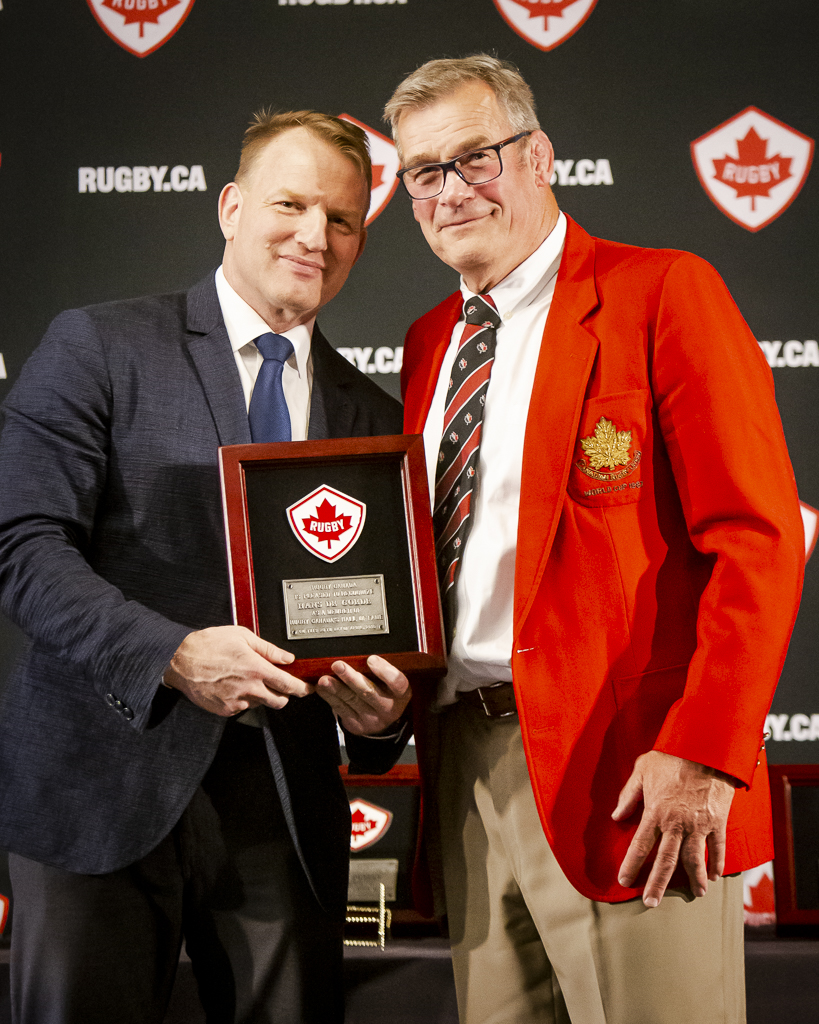
Hans de Goede played his entire career in the non-professional era of Rugby Union Football. During this period, the number of Canadian International games were limited. Some years, there were none at all. His senior playing years spanned 1971 to 1990. Hans learned to play rugby at Victoria High School under the tutelage of Tillman Briggs.
At age 17 while still at high school, Hans played one game for JBAA second team and the following week was promoted to the 1st Division Team (Premier), where he played for the remainder of his JBAA senior level playing days. During this period, he also played for three years with the Victoria Dolphins Canadian Football Team and was given a trial by the B.C. Lions Football Team at the time Coach Eagle Keys. Coach Keys remonstrated with him when he told Coach Keys that he would have to leave the camp to go back to Victoria to play rugby for James Bay, calling him "crazy". de Goede won eight Rounsfell Cup Provincial Championships with JBAA, five as Captain.
Hans was capped 24 times and Captained Canada at the inaugural Rugby World Cup in 1987 in New Zealand.
Julie Foster:
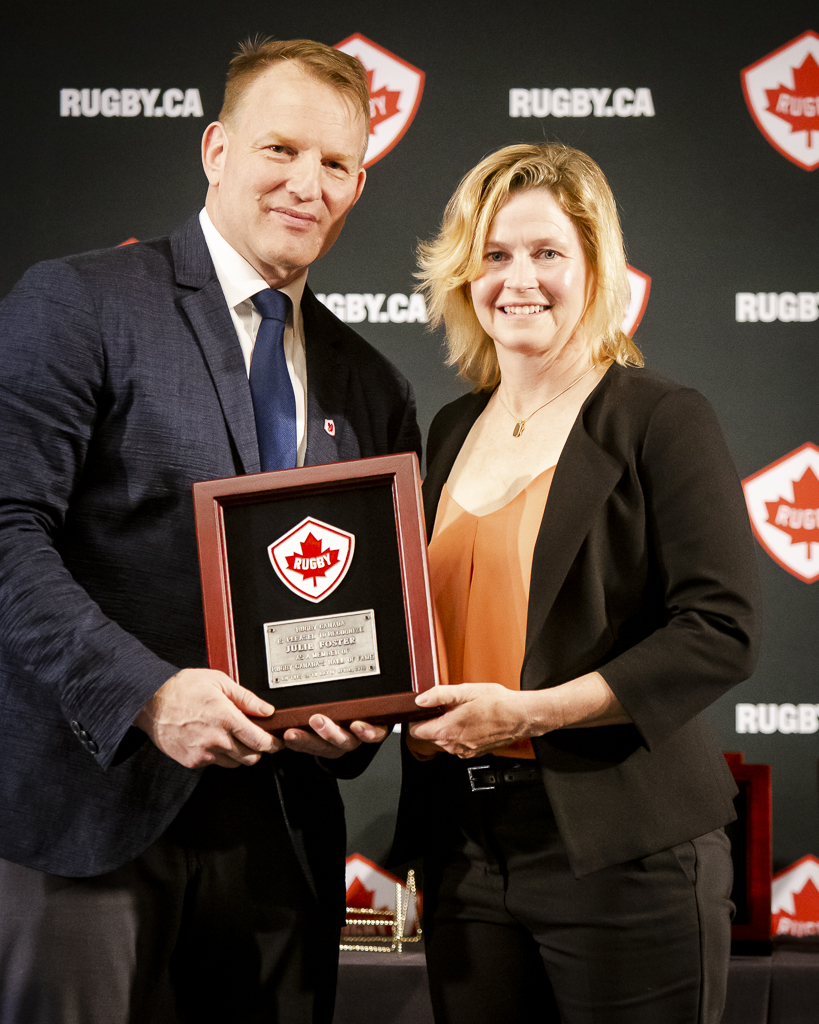
Julie Foster’s international playing career places her among Rugby Canada’s top athletes. During her decade long international career, she earned 44 international caps in the 15-aside game, always delighting the crowd with her talent and play making speed. While on the international (15 a-side) field, she scored 65 points. Julie also represented Canada at the first Hong Sevens Women’s competition in 1997 and in other sevens events until 2006.
Even in the early days of her playing career, Julie brought her considerable international experience home to Saskatchewan. In the role of coach and referee at the provincial, university and club levels, her experience and passion for the game leaves an indelible mark in that province. As much as she was a standout on the field of international play, and she was, Julie is exemplary in the level of her contribution to the game in her home province of Saskatchewan. Now, more than ten years since her last international game, she continues to lead and inspire young women and men participating in the game from the grass roots level through to the aspiring elite athlete. Julie coaches with both the fifteens and sevens women’s programs in Saskatchewan.
National playing record:
· First cap, 1996 vs New Zealand
· Last cap, 2006 vs France
· Participated in three Women’s Rugby World Cups (1998, 2002 & 2006)
· Was on Rugby Canada’s first National Women’s team at the 1997 Hong Kong Sevens.
· Has 44 caps (third most in Canadian Women’s record of those eligible for nomination)
· Scored 13 international tries for a total of 65 points, played mostly on the wing.
Provincial and Club playing record:
· Began rugby career with Regina Breakers in 1991
· Represented Saskatchewan Rugby in National Championships from 1991 to 2012.
· Founding member of the Regina Rage RFC, 2008 to present.
Refereeing appointments:
High school level from 1995 to present
Senior league game (men and women) from 1995 to present
Touch Judge at Canada Games 2005
Referee at Western Canada Games 2013 (date to be confirmed)
Fourth Official Canadian Rugby Championships in Regina 2016
Coaching appointments:
High school level from 1995 to present
U16 for the 2012 Western Canadian Championships
U18 for the 2018 Western Canadian Championships
· Coach, University of Regina Women’s Ice Hockey team, 1998 and then 2004 to present.
· Coach, Regina Rage, 2008 to present.
· Coach, Saskatchewan Women’s Team, 2013 to 2015 (one year was a combined Sask/Manitoba squad).
· Coach, University of Regina Women’s 7s, 2012 to present
Awards:
· CIS 2000 and 2001 All Star Ice Hockey honours (University of Regina)
· 2001 recipient of the Isobel Gathorne-Hardy Award (ice hockey)
· 2011 recipient of the Collette McAuley award, a national award recognizing rugby athletes that give back to their province.
Other sport involvements and honours:
· Represented Hockey Canada vs the USA in a two game series in 1993 in Texas.
Scott Stewart
Scott Stewart learned his rugby at Magee Secondary School before going on to play for the UBC Thunderbirds, UBC Old Boys, British Columbia, Canada, Harlequins and Bedford Blues. He made his international debut for Canada as a 20-year-old against the United States in September 1989 while he was still at UBC, another for British Columbia against the New Zealand All Blacks the same year, and played on UBC Past and Present against Otago (1990).
From 1989 until 1999 he became a mainstay in the Canadian line-up. He was a true utility athlete, playing every position in the Canadian backline. Although he began his career at fullback and played many matches at fly-half, Scott also wore the Canadian 11, 12, 13 and 14 jerseys at least once during his playing days.
For British Columbia he appeared in five National Championships (1989, 1990, 1992, 1993 and 1994) at the senior level and three National Championship teams (1987, 1988, 1989) at the Under 19 level. He toured to Wales with Canada Under 19 in 1988, when he played in both internationals, and played for British Columbia Under 19 against the Pacific Coast in 1989.
In addition to playing for Canada Under 21 against the USA Collegiate All Americans (1988 and 1989), he was also in the senior lineups for British Columbia against Scotland (1990) and England Students (1991) Stewart was in Canada’s lineups in the 1991, 1995 and 1999 Rugby World Cups and ended his career against England in 2001. Although he was not Canada’s preferred goal kicker, he nevertheless got his share of conversions (9) and penalty goals (14) in fourpositions – fullback, center, wing and fly half, while earning five tries.
He was also a talented Sevens player for Canada over a span of five years when he played in Dubai (1992, 1995), Canberra (1993), Fiji (1993, 1997), Hong Kong (1993, 1994, 1995, 1996), Punta del Este (1997) and in the 1993 (Scotland) and 1997 Hong Kong) Rugby World Cup Sevens and the 1997 Qualifier.
Stewart started his career during the amateur days before assuming a successful career as a professional player with London Harlequins from 1997-1998, when he played in 16 matches, two as a replacement, and Bedford Blues from 1999-2000, when he played in all 25 matches.
Stewart’s first Rugby World Cup experience took him to France in 1991 where he scored the only try of the match in Canada’s opening round victory over Fiji. He started in three of the four matches and came on as a replacement once. In three of the matches he was a wing and in the fourth, where he was a replacement, he was a fullback. Stewart went on to represent Canada in two more Rugby World Cups: in South Africa in 1995 and France in 1999. He started in all four games in 1995 and all three in 1999.
He played in most of the games in the 1996 and 2001 Pan-American and 1996-1999 Pacific Rim Series and in the 1998 Rugby World Cup Qualifiers.
Stewart’s last international match was on June 9, 2001 against England. He finished with 64 capsfor his country, playing against all of the top rugby playing nations, including New Zealand (2), England (5), France (4), Australia (3), South Africa (2), Wales (4) and Argentina (4). When he retired he was the second most capped player behind Al Charron. He scored five tries for his country and had a career total of 84 points, including 17 in Canada’s 27-27 tie against Ireland in 2000. Stewart is also one of the few players in the world who has played in a total of five Rugby World Cups - 3 in Fifteens and 2 in Sevens.
In 2018 he was inducted into the BC Rugby Hall of Fame. Following his retirement in 2001 he coached Canada Under 21 (2003-04), University of Western Ontario (2003-2006) and has been the UCLA Bruins head coach since 2004.
Mark Wyatt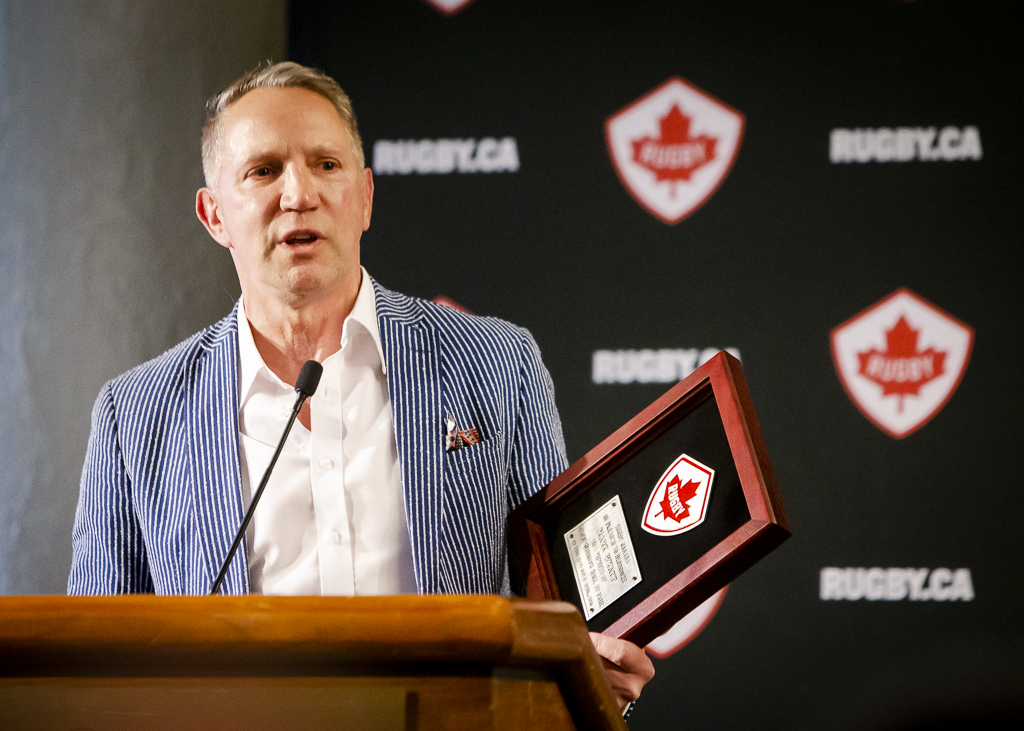
After appearing in three Rugby World Cup games in 1987, Mark Wyatt became the second Victoria player to captain a Canada World Cup team when he led it to France in 1991. (The first was Hans de Goede in 1987). His kicking talents first came to the fore in 1980 at Oak Bay Secondary School and British Columbia Under 19 then with James Bay Athletic Association for a year before honing and applying them with University of Victoria, Velox, Vancouver Island Crimson Tide, British Columbia and Canada. Capped in 29 of the 31 matches that Canada played between 1982 and1991, he was Canada’s top point scorer with 260 when he retired in 1991. In that total were 5 drop goals.
Except for 1988, Wyatt played for British Columbia from 1982 to 1989 in the National Championships and toured with Canada to Japan (1982) and Australia (1985). He faced 12 countries during his 11-year international career: Japan, England, United States, Italy, Tonga, Ireland, Wales, Argentina, Scotland, Romania, France and New Zealand.
Comfortable at fly half or full back, though he was on a wing in 1989 against the United States, Wyatt’s ability to kick with either foot made him a selector’s dream. His booming spiral kicks and most of his penalty goals were a sight to behold and some of the latter are worth mentioning. When he was the fly half in 1985 against the United States he kicked 6 penalty goals and one drop goal. As fullback in 1989 against Ireland he kicked 6 penalty goals and in 1991 against Scotland he kicked 8 penalty goals to establish a world record. In 1991 against Japan, he kicked seven conversions, one penalty goal and scored his first ever try for Canada.
His leadership qualities were such by 1990 that he was captain in the six games leading up to the 1991 Rugby World Cup and in that event was captain three times, with only injury prevented the fourth.
Wyatt’s many abilities were recognized not only in Canada but also overseas where he played for the Barbarians against the North of England in 1988 and against Cardiff and Swansea during their 1991 Easter tour of south Wales. He was also invited to play for the World Invitational XV against Australia in 1991 in celebration of that country’s bicentennial.
Further, he was a gifted player in Sevens from 1983 to 1991. He was captain three of the seven times Canada went to Hong Kong, at the Sydney Bicentennial Sevens (1987), at the Australia Sevens (1988) and at the Gala Sevens (1991).
Twice named Victoria’s Male Athlete of the Year, inducted into the Greater Victoria Sport Hall of Fame and the BC Rugby Hall of Fame, Wyatt’s value to rugby as a player with superb kicking and leadership skills was without question for his school, clubs, British Columbia and Canada.
2017
Dr. Ian Birtwell
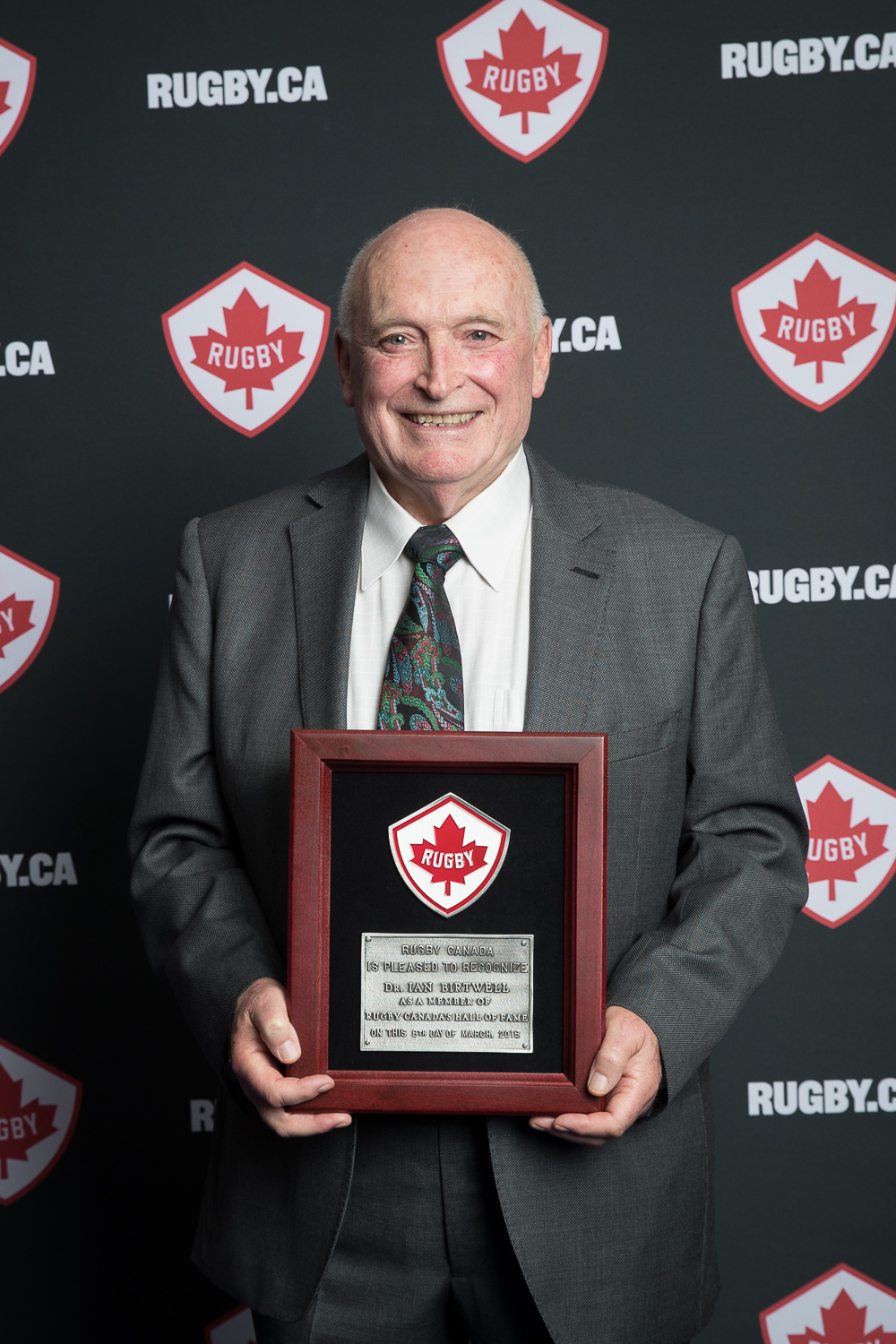
Immigrating in 1972, Birtwell came to Canada from England having played for Sedgley Park, Kings College, University of London, and Hampstead. He joined the Meraloma Club in Vancouver, but in 1975 repeated injuries stopped him playing and he started coaching. Initially, and over 4 years, he coachedhis club and representative junior-age teams. Over the next 9 years he coached senior men’s teams for the club, Vancouver District and British Columbia. At all these playing levels his teams were highly successful and victorious in domestic, national, and international competition.
In 1989 Birtwell was appointed as National Coach of the Senior Men’s Team were he held this position for six years - the longest term of any Canadian National Rugby Team coach to the present day. Dr. Birtwell’s coaching philosophy interpreted the demands and challenges of the international game, and he understood how these had to be metand what skills and strategies to employ and develop. His time of coaching all levels provided an opportunity to honeand verifyhis methods, and hewas ahead of his time in the use of analytics and working alongside sport scientists.
Birtwell and the National team produced positive results, finishing with a record of 22-16 over the course of his six years in charge. Birtwell’s squad for the 1991 Rugby World Cup gave an exceptionally strong showing, losing to New Zealand in the quarter-finals. The team was given a standing ovation based on their inspiring performancein that game and during the competition. The team’s World Cup performance elevated them to a notable top 8 world ranking, the highest achieved by the National Men’s Team. Through Birtwell’s leadership Canada’s Senior Men’s Team became known internationallyas a rugby sidewhich was competitive with the best and onethat continuously developed, was strong up front, resourceful behind, and with a brilliantly strong defence. He took Canadian rugby intouncharted territory.
Dr. Maria Gallo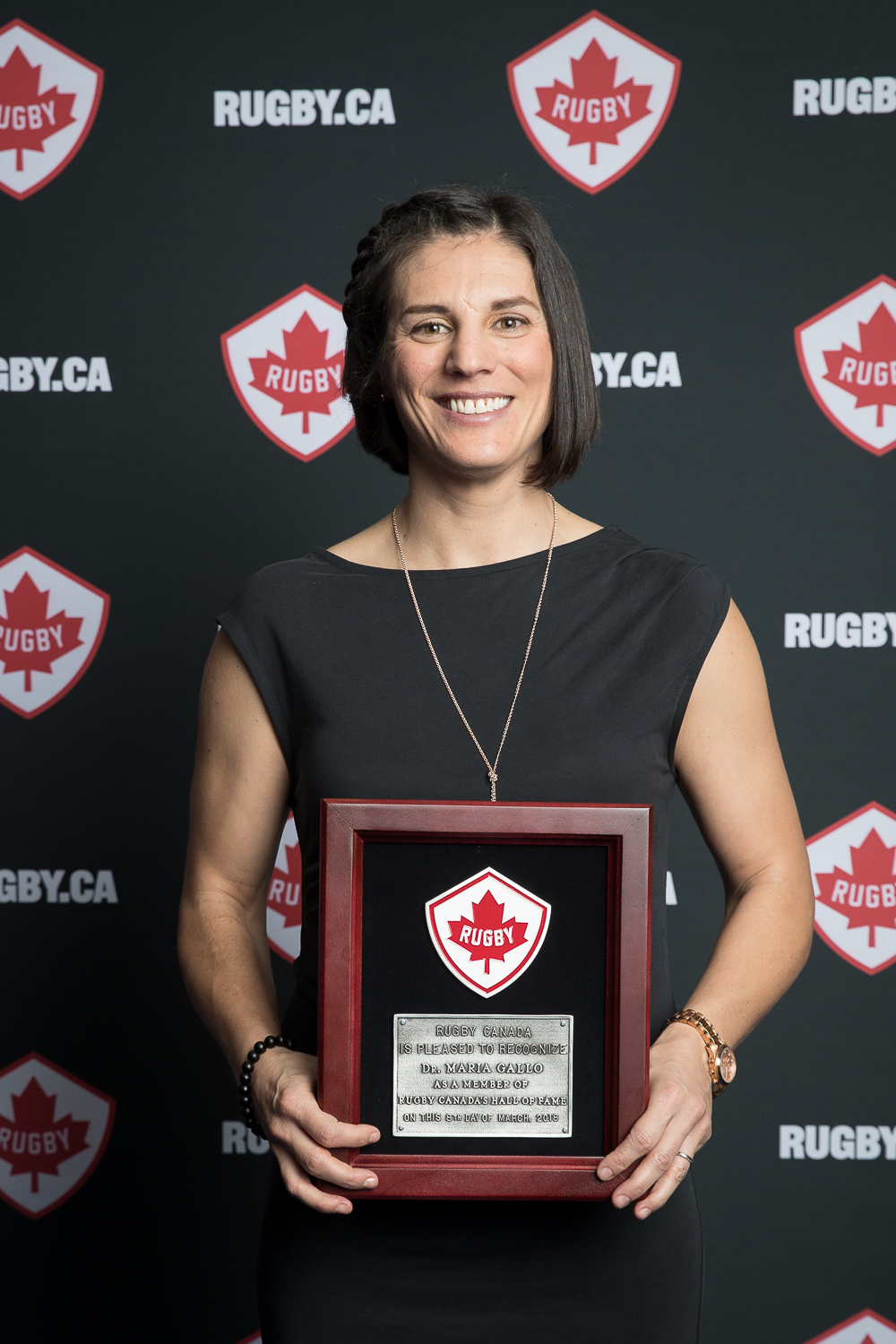
Mario Gallo began playing rugby at St. James High School in Guelph launching a career that would last fifteen years and take her around the world.
She starred as a member of the Guelph Gryphons from 1996-2000 leading her team to four provincial titles and the inaugural CIAU championship in 1998. She and the Gryphons would win the CIAU silver medal the following season. Both times she was named a tournament all-star and the event’s most valuable player. Gallo was a two-time OUA all-star (1997 & 1998), an All-Canadian in 1998, and Guelph’s Female Athlete of the Year that same year. After graduating from the U of G, she moved to the University of Alberta where she won two more national titles in 2001 and 2003 and was named the Panda’s Female Athlete of the Year and the CIAU Player of the Year in 2002. She did all this while earning her Ph.D. in Muscle Exercise Biochemistry.
Her next stop on the rugby pitch was playing for Canada. She was a vice-captain for several years playing on the national 15’s rugby team from 1999 to 2010. She was a mainstay of the national team playing a total of 55 international caps and in two World Cups – 2002 and 2006. In 2006 she had the second most tries of any player in the event with six. Gallo played with Canada’s national 7’s rugby team from 2008-2010 where again her leadership and dogged determination paid off as she was named team captain leading our country into the 2009 World Cup.
In 2002 and 2003 she filled her winter months as a member of Canada’s Bobsleigh team, finding the power she had developed in rugby was a natural fit when it came to the explosive starts necessary in bobsledding.
Gallo is now the head coach of the UBC Thunderbirds Women’s 7’s and 15’s rugby teams taking the 7’s squad to their first national title in 2016. While at UBC she completed her post-doc in blood doping and in 2010 was elected to the Guelph Gryphon Hall of Fame. She was also inducted into the Guelph Sports Hall of Fame in 2016.
Monty Heald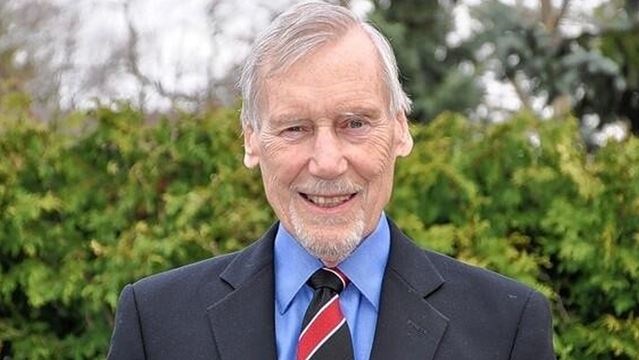
Born in Derby, England Monty Heald became involved in rugby at Royal Masonic School, in 1949. He played for Derby R.F.C. over a fifteen year period, captaining the team for two years. Immigrating in 1968, Heald played for the Hamilton Hornets from 1968 to 1972. In 1973 the Burlington Centaurs Rugby Club was founded, where Heald became a founding member and the Club’s first captain. Heald’s commitment ultimately earned him Life Member of the Club recognition.
Ending his playing career in 1988, Heald chose to continue his involvement in the sport by maintaining administrative roles at a number of levels. He served the Niagara Union as the Director of the Senior Team, and the Ontario Rugby Union as a selector for two years. In 1981, Heald became a National Selector, chairing the C.R.U. Selection Committee from 1983 to 1994. In 1984 he was appointed as the Manager of the Canadian Sevens team and was elected to the Board of Directors of the Canadian Rugby Union in 1986, serving as Director of The National Team until 1991. In 1991, he was elected as President and served in this capacity for eight years. During his leadership, the Union effected a major change in name to Rugby Canada, leading to the National Union becoming significantly more involved in the activities and programs of the International Rugby Board – or World Rugby as we know it today.
In concluding his term as a Director, Heald’s total years of service to the National Union capped off at 20 years. He continued on as Chair of Rugby Canada’s Past Presidents committee, Chair of the Hall of Fame committee and member of the Annual Awards Committee. For his endless support and dedication to rugby in Canada, Heald was given the honour of an Honorary Lifetime Member of Rugby Canada in 2013.
Ruth Hellerud-Brown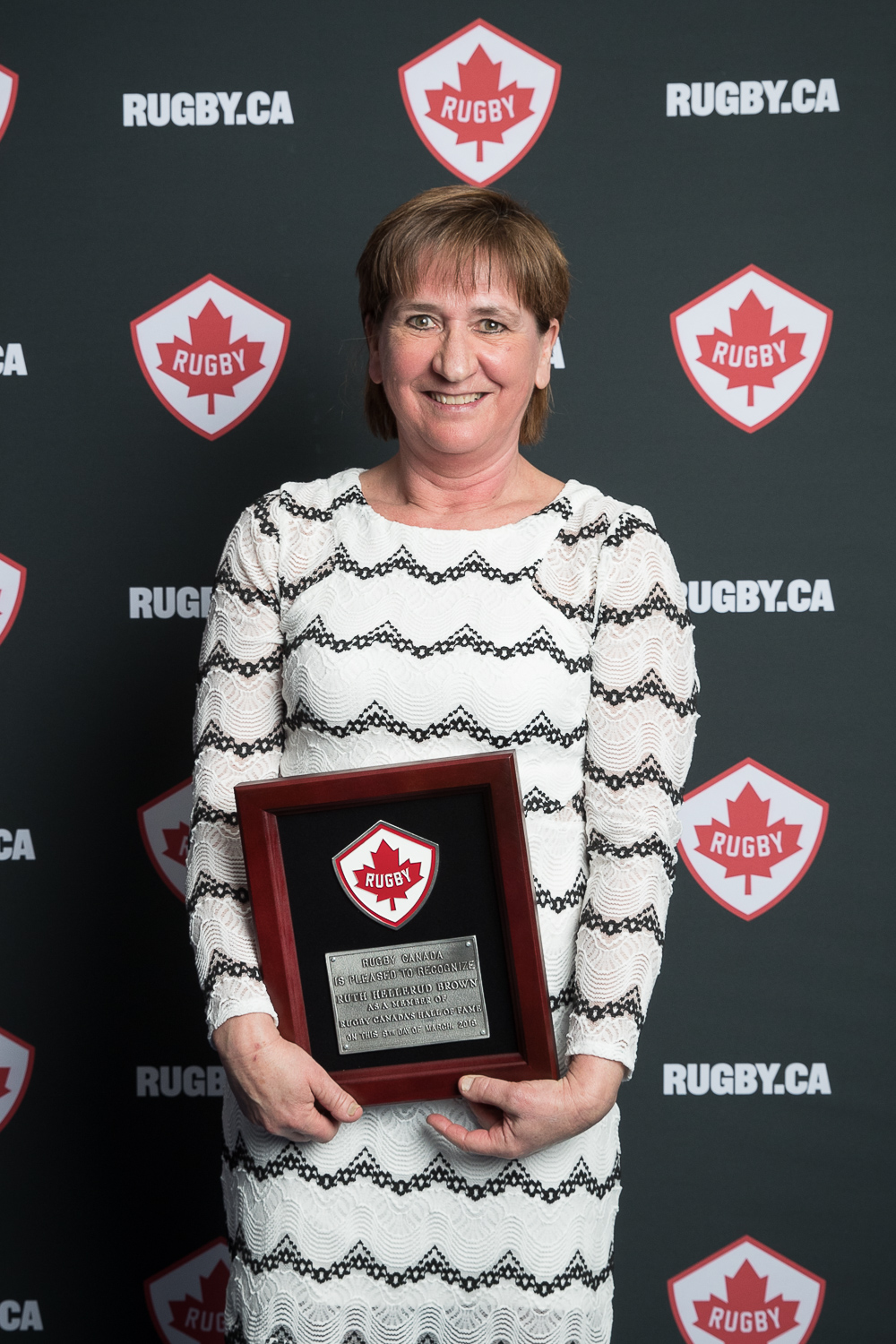
Widely recognized as an architect of the game for women in Canada. A force and a leader on the field in the beginning days of the game, she devoted considerable efforts to expand and raise the level of play in three provinces. Ruth represented the Alberta Rugby Union, Saskatchewan Rugby Union, and BC Rugby Union at National Championships from 1984 to 1993. A member of the 1987 squad, Canada’s first women’s rugby team, Ruth also took on the role of Director of the National Women’s team for that inaugural match. As an international player, she earned 11 caps, captaining the team on 9 of those occasions. Her first and last caps were against the USA in 1987 and 1993.
In British Columbia a once flourishing women’s league had dwindled down to only one in the lower mainland by the late 80’s. This prompted Ruth to establish a women’s team at the Vancouver Rowing Club upon moving to Vancouver - offering up at least one other competitive team. Once the Rowers were well established Ruth launched another team at the University of British Columbia in 1991 where she was pursuing a second degree. Ruth began her coaching career with UBC Women’s Rugby team and continued to lead the team for three years after which she returned to coaching at the Rowing Club.
She earned her NCCP Level III coaching certification and coached the BCRU Senior Women’s team for many years, being one of the first women to coach a provincial squad to a National Championship. In BC, in particular, her impact on the development of the game for women is indelible and is recognized in the naming of the Senior Women’s premier competition in her name, the Ruth Hellerud-Brown Cup.
Spence G. McTavish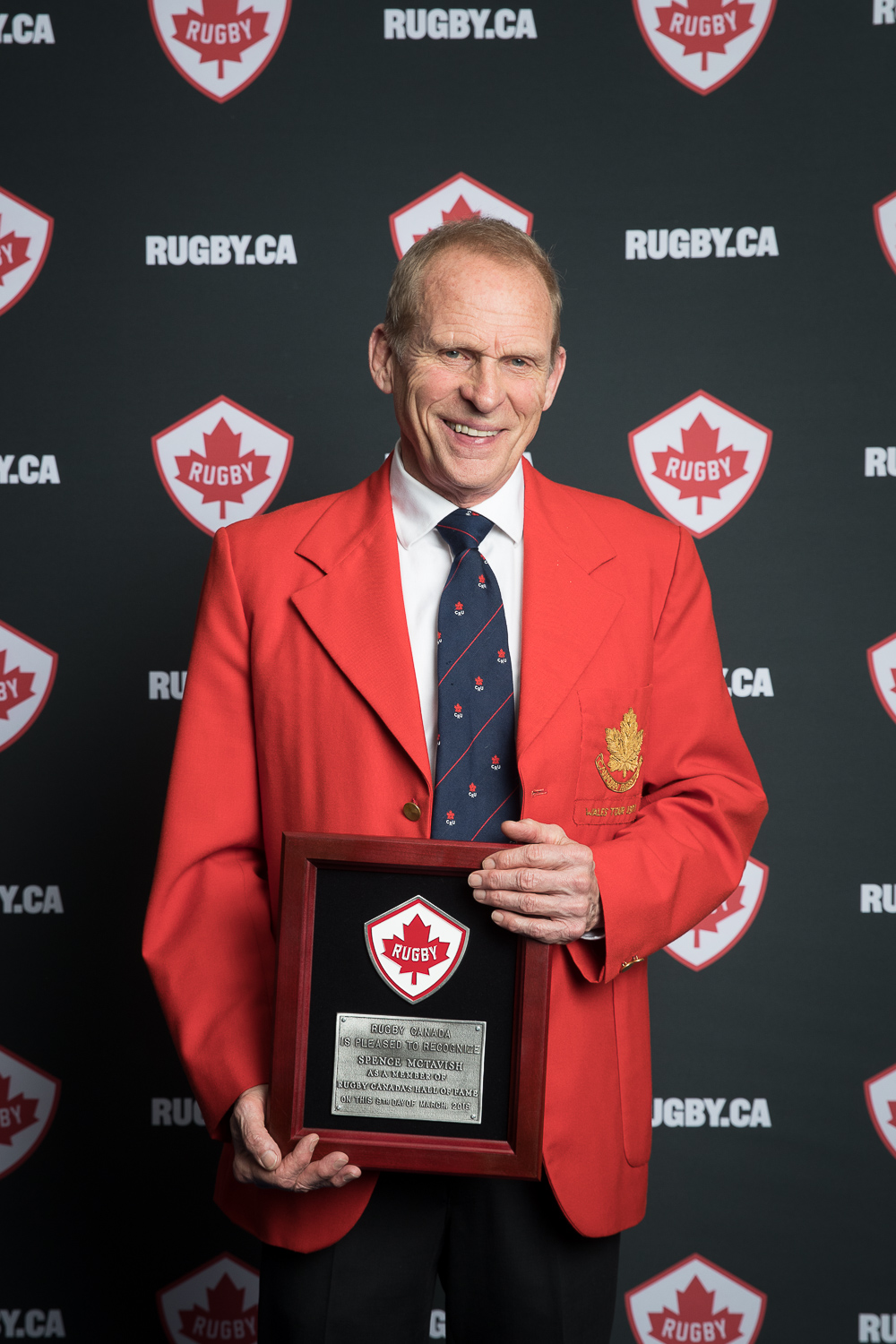
McTavish’s high level of performances and record during his rugby career as a club, sub-union, provincial, and national team player is quite remarkable. After a stellar career at UBC, he was a founding member of the UBC Old Boys for whom he played from 1974-1989 and coached them to two provincial titles in 1990 and 1991. He returned to UBC in 1992 and coached there until 2014.
Having not yet been selected for BC, McTavish was chosen to represent Canada against Fiji in 1970 and by 1987 had become both BC’s and Canada’s longest serving player of international standing. He scored a try in his first ever game and seventeen years later was in the lineup for two of Canada’s three appearances in the very first Rugby World Cup. McTavish’s 22 international appearances for Canada from 1970-1987 were remarkable considering that only one other Canadian player has had the equivalent longevity on the national team. His ability as a leader was verified by his captaincy for two of four overseas tours made by Canada. On the 1979 Wales, England, France tour, he played in all six games and was captain of two. McTavish’s talent was recognized overseas by his selection to the Irish Wolfhounds in 1973 and in 1976 to the Overseas XV against Cardiff.
McTavish’s record in the fifteen-a-side game almost parallels his exploits in the seven-a-side version. During his three years in the Hong Kong Sevens, McTavish was also captain. From 1994-1998 he returned to the 7’s game, coaching Canada’s National 7’s team, including the 1997 Rugby World Cup and the 1998 Commonwealth Games. Believing that one should lead by example, McTavish provided ample evidence during his outstanding career for others to emulate.
Douglas “Buzz” Moore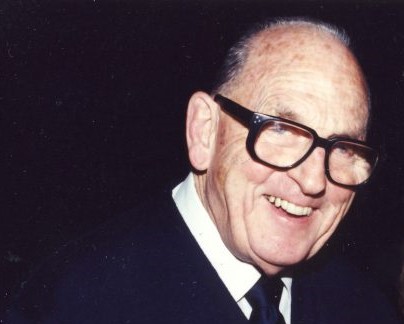
Douglas Moore, known to most as "Buzz", moved to Vancouver from Regina in 1925 at age 4. His time at Vancouver’s Lord Byng High School allowed Buzz to excel at football, skiing, and rugby. Showing much promise in rugby, he joined the Meraloma Rugby Club at age 16 and began playing for the senior side. During a prolific senior rugby career that lasted twenty-eight years, he was awarded the Howie McPhee Memorial Trophy as Vancouver’s outstanding rugby player.
Buzz captained both the BC and Canada sides in 1948 until 1962 against Australia, New Zealand, England, Scotland, Wales, Ireland, USA, Japan and Fiji. At 42, he led Canada on a three-month long tour of Great Britain during which his side took on the famed Barbarian Club. A 3-3 tie resulted after which Buzz was presented with one of rugby’s highest awards, “Honorary Barbarian”.
Buzz retired from play in 1965 following a Canadian Rugby Championship with BC. Throughout his career he held various administrative roles including Coach and President of the Meraloma RFC and President of the Vancouver Rugby Union from 1954-1966. In 1967 he was inducted as a builder into the BC Sports Hall of Fame and in 1975 was awarded the Jack Patterson Memorial Trophy. Buzz joined the UBC Athletics department in 1964 and was consistently involved there until his death in 2011. Buzz was inducted into the UBC Sports Hall of Fame in 1995 and received an Honorary Doctor of Laws Degree from the University in 2002.
Stephanie White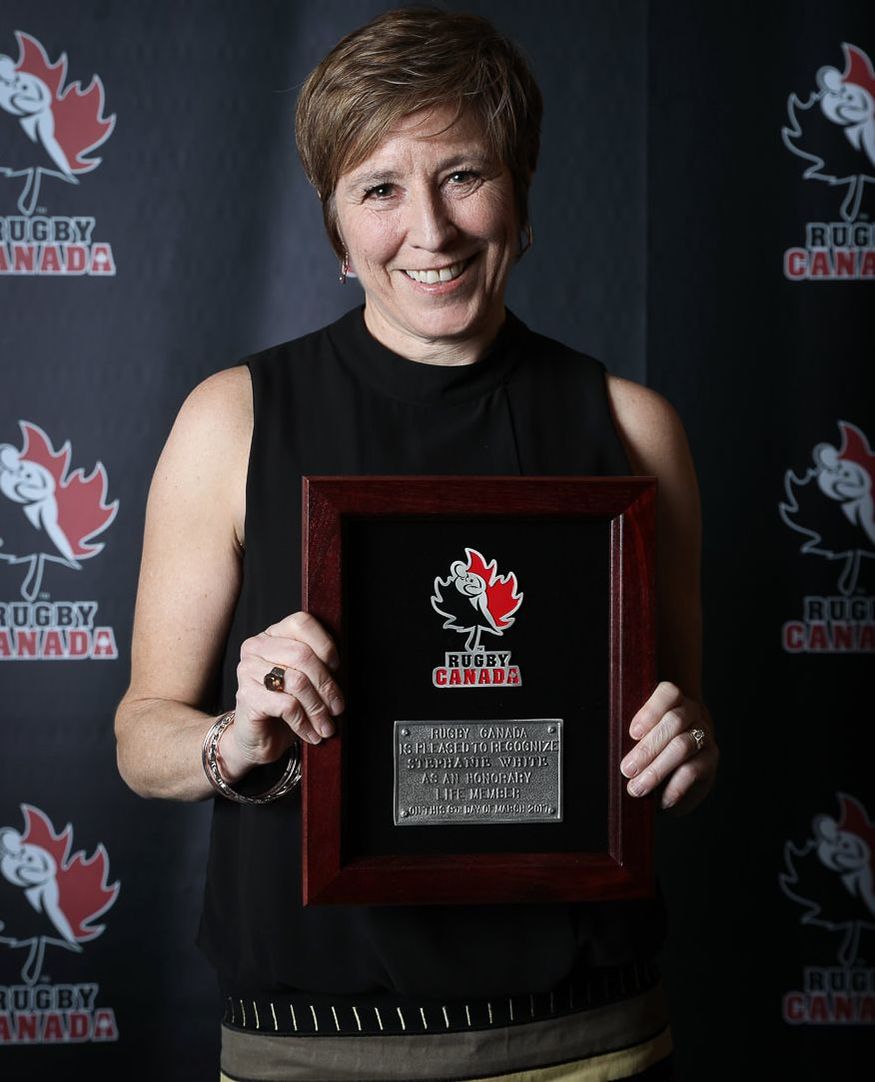
A forefront for women’s rugby, White chose to take up the game in 1980. She was active in the administration of Women’s rugby for the province of Alberta while being a trailblazer on the field of play. She was the Captain of the First Canadian Women’s Rugby team in 1987 and 0represented Canada in the early years before being appointed Co-Captain of Canada’s first World Cup Team in 1991. In 1994, she Captained the team at the Second Women’s Rugby World Cup and continued her involvement with the National team participating in two Canada Cup competitions. She also captained the first participating Canadian women’s team at the Hong Kong Sevens invitational tournament in 1997. White retired from Representative Rugby in 1997 and earned a total of 17 caps in 10 years of play.
Along with her distinguished playing career, White devoted years to the growth women’s rugby in Canada. Some of her major contributions include being a director on the Alberta Women’s Rugby Union; Director of Women’s Rugby on the Board of Directors for Rugby Alberta in the late 1980’s; was the Women’s Players representative at the Rugby Canada Strategic Planning session in 1995. She sat on the B.C. Rugby Union Board of Directors and helped bring the West Coast Women’s Rugby Association into the BCRU in the early 2000’s and served on the Rugby Canada Board of Directors from 2007-2013.2016
Al Charron
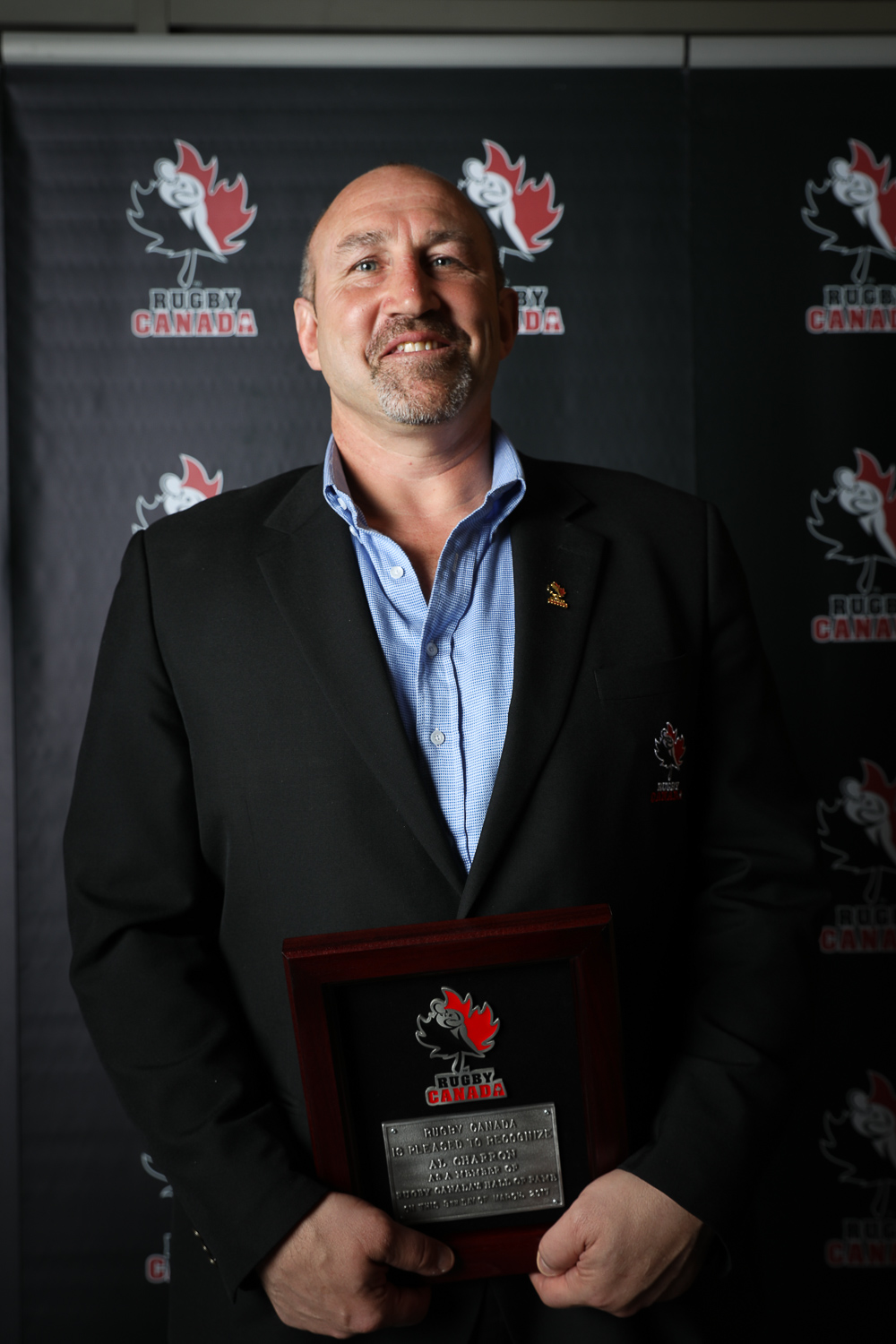
Charron, one of the most dominant rugby players of his time, is Canada’s all-time caps leader after suiting up as a starter in all 76 appearances for his country, including 25 times as captain, a Canadian record he shares with Gareth Rees. Charron made his test debut against Argentina in 1990 and made his final appearance at the 2003 Rugby World Cup against Tonga.
Charron played in four Rugby World Cups and went to a fifth as part of management team. He was a member of the inaugural Rugby World Cup Sevens squad in 1993 and also played in the famous Hong Kong Sevens on three occasions. He is the only Tier 2 player to have scored test tries against New Zealand, Australia and South Africa.
Over his distinguished career, Charron also made five appearances for the famed British Barbarians and also suited up as part of the World 15’s squad that faced Argentina to celebrate their centenary anniversary in 1999. Charron played for Bristol, Moseley, Pau and US Dax overseas and domestically suited up for the Ottawa Irish Rugby Club where he helped them win multiple provincial championships, across the McCormick Cup and sevens leagues. He also won National Championships with Ontario and the English Division 2 championship with Bristol.
Charron has been inducted into the Eastern Rugby Ontario Hall of Fame, Ontario Rugby Hall of Fame, Ottawa Sports Hall of Fame and is recognized as being one of the top 100 athletes to come from Ottawa. Rugby Canada’s newly announced training facility, located in Langford, BC, will be named the ‘Al Charron Rugby Canada National Training Centre.’
Gillian Florence
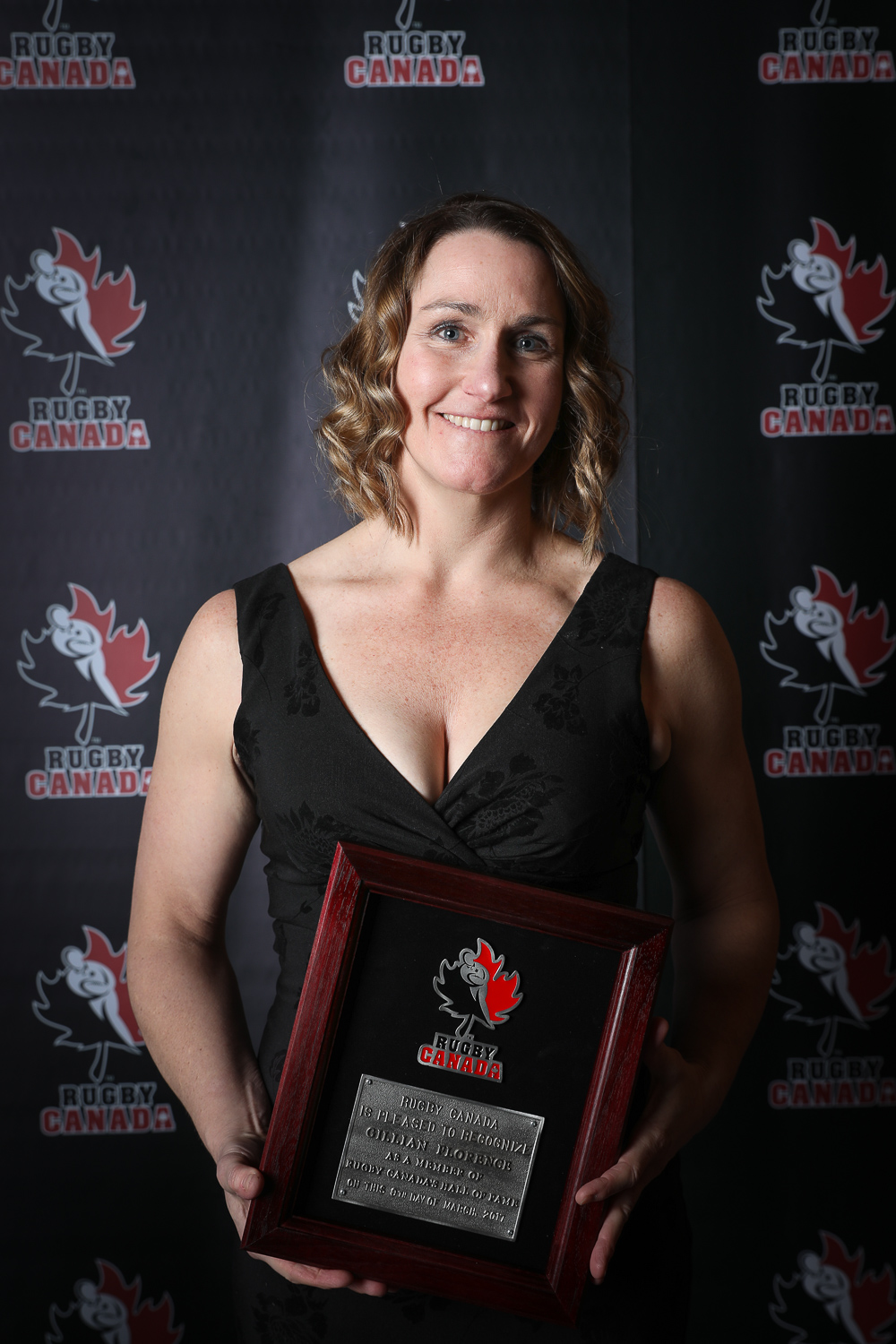
An astonishing talent, Florence is the most decorated Canadian female player of all-time after a fantastic two decade plus career.
Hailing from Hudson, Quebec Florence played for Canada a record 66 times and is one of only five players to play in five Women’s Rugby World Cups after playing in the 1994, 1998, 2002, 2006 and 2010 editions of the tournament. Florence made her senior debut at the 1994 tournament at the tender age of 18.
Florence was named to the 2003 World XV to play against the New Zealand Black Ferns and retired from international competition in 2011. Domestically, Florence played for Ste. Anne de Bellevue RFC for 22 years and represented Quebec for 18 years and was part of the 2000 and 2001 sides that won the National Championship.
The annual senior women’s player award is named in Florence’s honour which is awarded to the “player who best represents the qualities of Canadian rugby as voted by her teammates.”
Ro Hindson
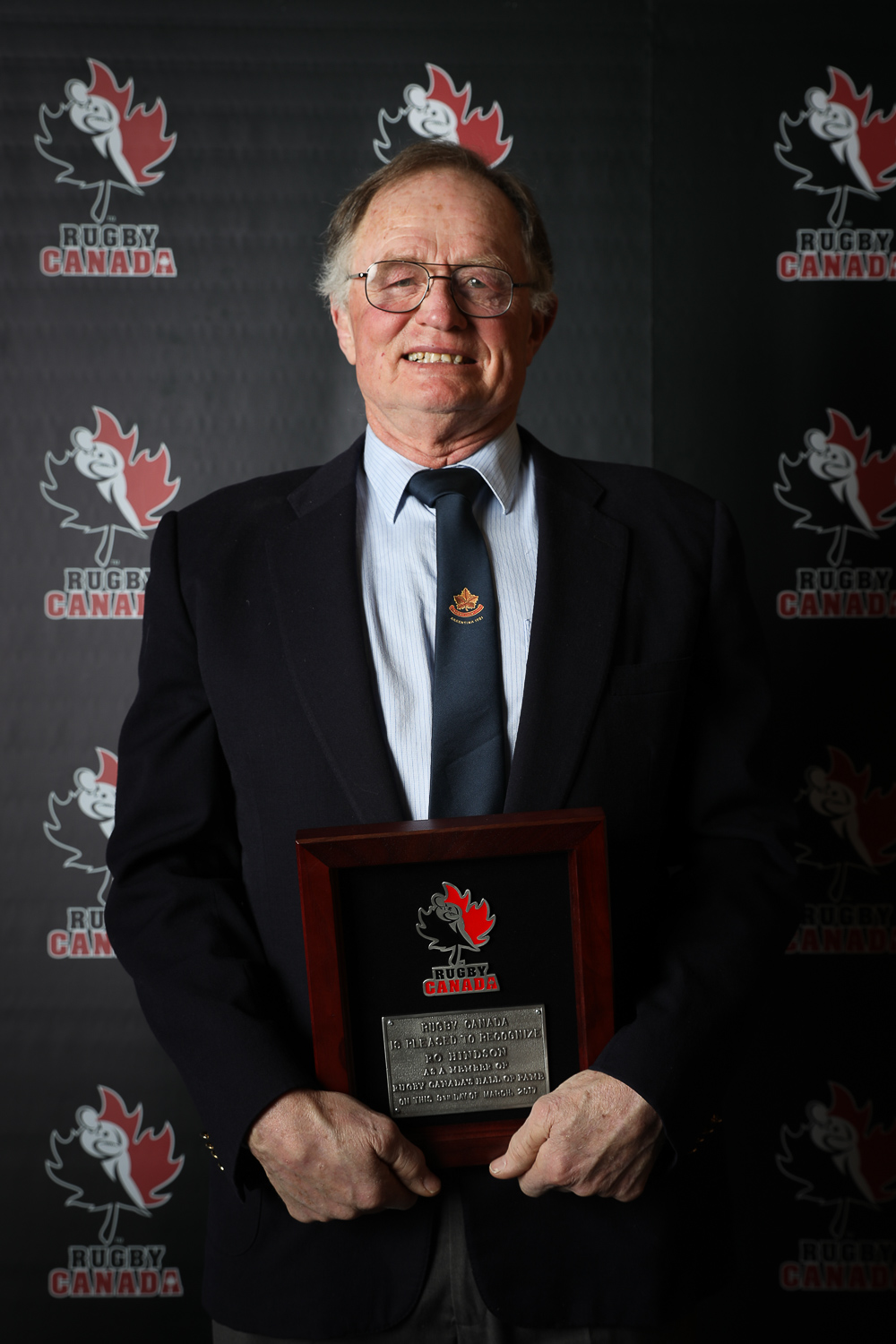
A dominant specimen, Hindson was a force in both the sevens and fifteens editions of the game on the international scene.
Hindson won 31 test caps for Canada and was a member of the inaugural 1987 Rugby World Cup squad. Hindson made his debut in 1973 against Wales before suiting up for the final time in 1990 against Argentina. When he retired, he was Canada’s all-time caps leader.
On the sevens front, Hindson played in the famed Hong Kong Sevens from 1980-1987 as well as the 1987 Sydney Sevens.
In Canada, Hindson played for the Penticton Harlequins RFC, Castaway Wanderers, Oak Bay Wanderers, UBC Old Boy Ravens as well as the University of Victoria, Vancouver Island, University of British Columbia as well as provincially for BC. He was also the only Canadian to play for the South Pacific Barbarians against the South African Barbarians in their 1987 tour. He also lined up for the World Team against Ireland as part of their centenary celebrations in 1973.
Hindson has been inducted into the BC Rugby Union Hall of Fame and the BC Sports Hall of Fame.
Mike Luke
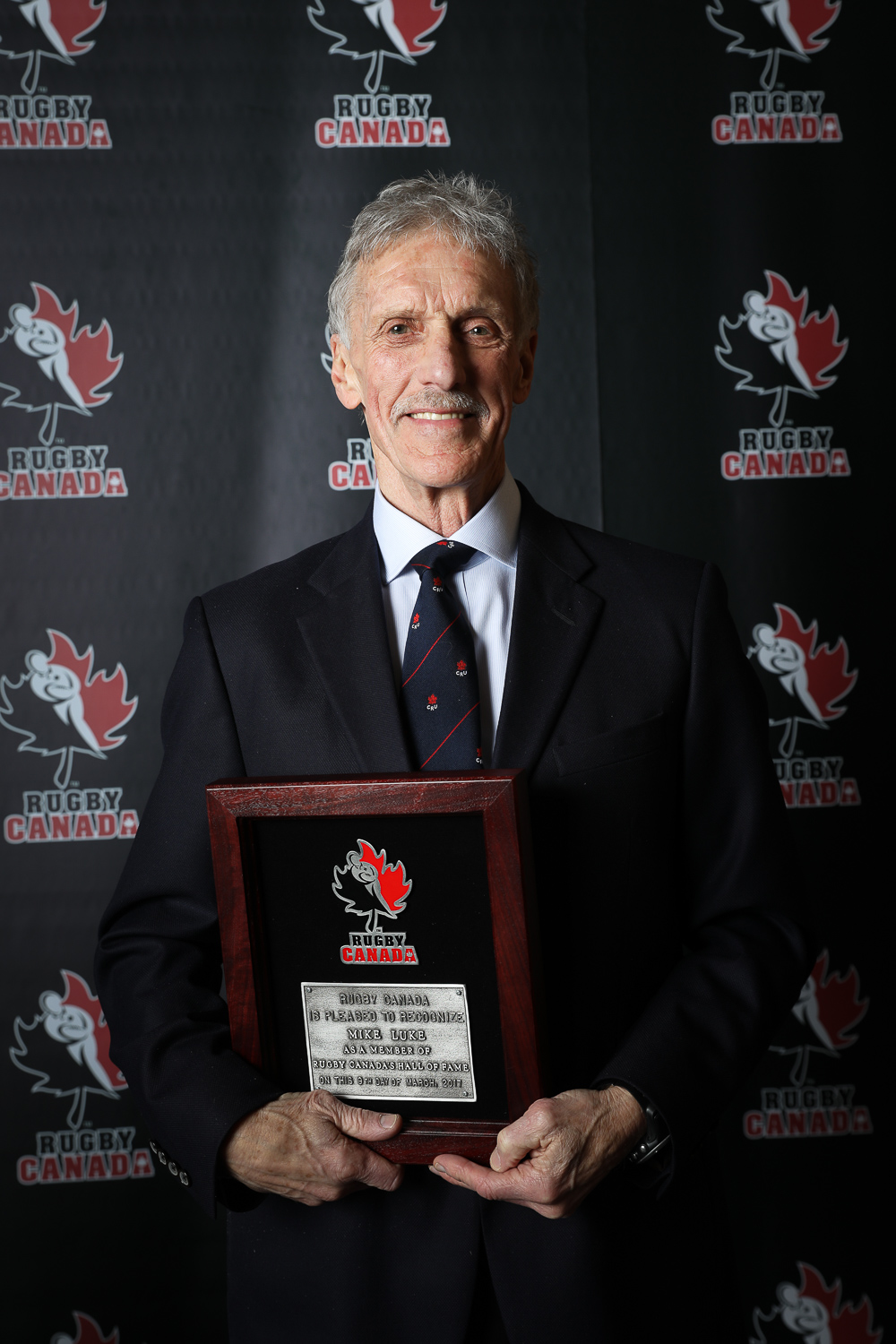
After arriving in St. John’s, Newfoundland in 1969, and finding no club to play for, Luke established the St. John’s club and was co-founder of the Newfoundland Rugby Union and its first president.
Luke played 16 test matches for Canada, making his debut in 1974 against Tonga and bowing out against the USA in 1982. Luke captained Canada on eight occasions. He also represented the Barbarians on three occasions and was a member of the Overseas XV that played against Wales as part of the Welsh Rugby Union Centenary celebrations. He also played for the Meralomas in Canada and for the Pirates R.F.C. and Harlequins F.C. in the UK.
He was the coach and manager of Canada’s sevens team in the 1981 Hong Kong Sevens and also coached Canada’s U21 team from 1987-1989. He was an assistant coach and manager of the Canadian squad that reached the quarterfinals of the 1991 Rugby World Cup.
Luke served on the Board of Rugby Canada and was a member and then Chair of the Rugby Canada National Coaching Committee for over 20 years. He became a Master Coach in Canada's National Coaching Certification Program before being elected Chair of the National Coaching Certification Council in 1993.
In 1999, Luke was the recipient of the 3M Coaching Association of Canada Coaching Award for Sport Development and in 2006 received the IRB Development Award for his contributions to the growth of rugby in Canada.
Gareth Rees
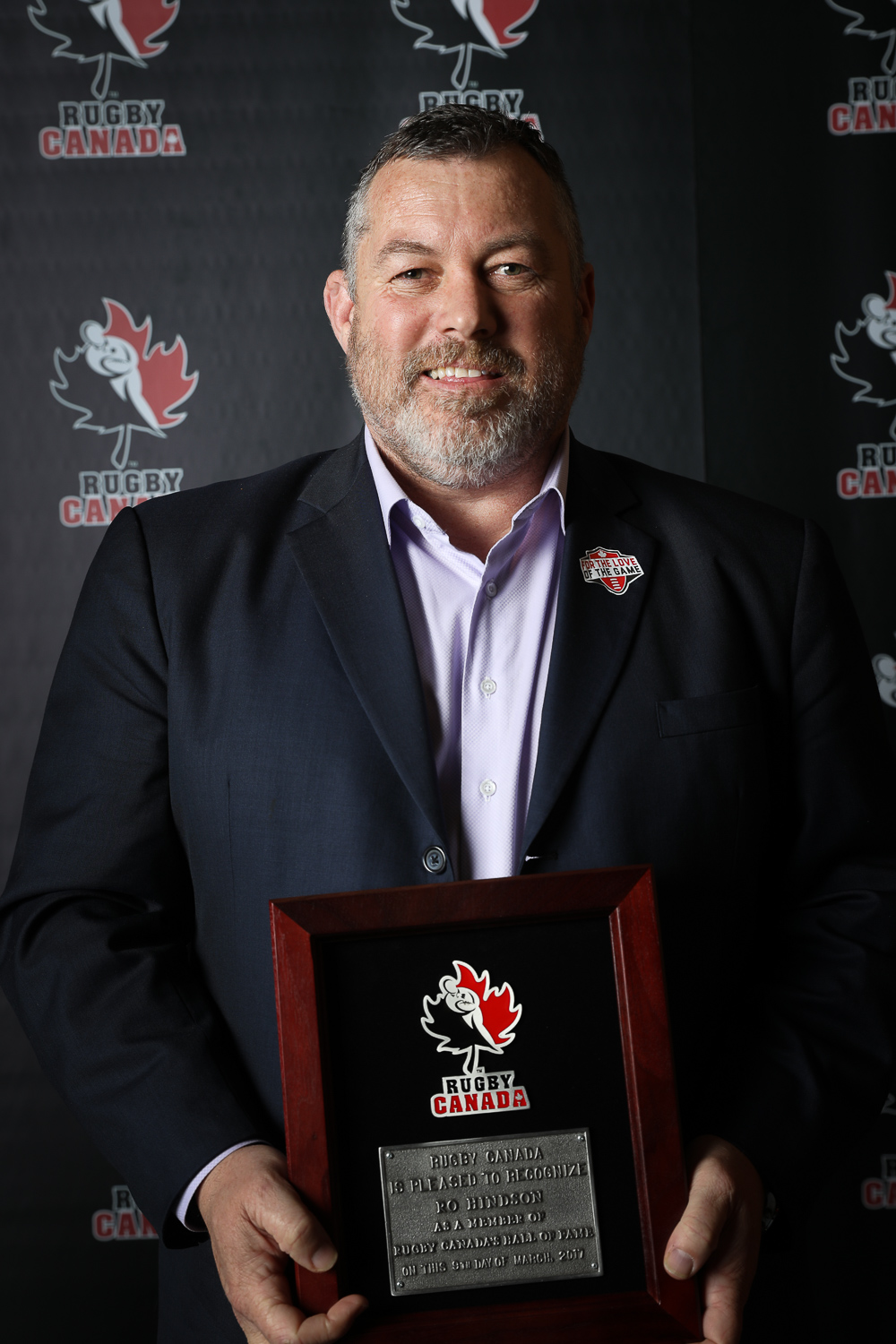
One of the most recognizable rugby stars of all-time, Rees won 55 test caps over a sensational career and played in four Rugby World Cup’s. He became the first North American inducted into the World Rugby Hall of Fame in 2011.
Rees’ 491 points are the second most in Canadian test history while his 120 points in Rugby World Cups also remain a Canadian record. The Victoria, BC product made his test debut in 1986 and played in test victories over Argentina, Wales, Scotland and France as well as Rugby World Cup quarterfinal appearance in 1991. He retired in 1999 having captained Canada in two Rugby World Cups and 25 times, a record he holds with Al Charron.
In Europe, Rees attended Oxford University and played professionally for Wasps, Newport, Merignac and Harlequins where he won various cup and league competitions as well as scoring titles. He also represented the famed Barbarians four times. In Canada, Rees suited up for the University of Victoria and Castaway Wanderers and represented his province on many occasions.
Furthermore, Rees played for Canada at the U19 level and also played in the Sydney World Sevens and Hong Kong Sevens in 1988 as well as the 1992 Dubai Sevens.
In addition to the World Rugby Hall of Fame induction, Rees has been inducted into the Greater Victoria Sports Hall of Fame, BC Rugby Hall of Fame, BC Sports Hall of Fame and Canada’s Sports Hall of Fame, where he was the first rugby player so honoured.
Rod Snow
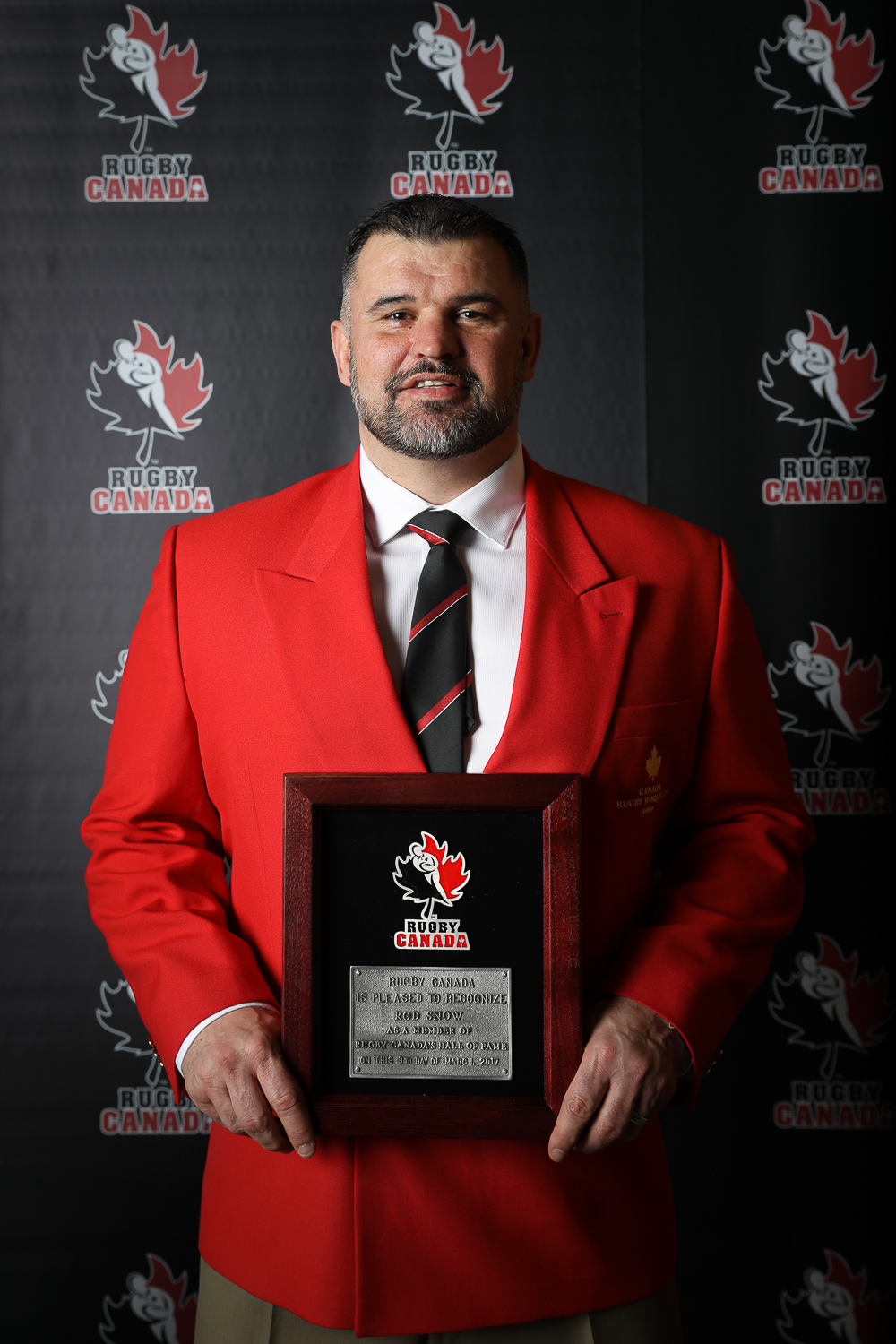
As one of the most prolific front rowers in Canadian rugby history, Snow enjoyed an illustrious career that saw him play in four Rugby World Cups for Canada.
The Bonavista, Newfoundland native, won 62 test caps for Canada, the most of any front rower. He made his test debut against Argentina in 1995 and made his final test appearance at the 2007 Rugby World Cup against Australia. He scored eight test tries during his career.
Snow played for Eastern Province in the 1995 Currie Cup where he started in all six matches. He would go on to play professionally with Newport RFC, where he is the highest scoring prop in their 140 plus year history, as well as the Newport Gwent Dragons making over more than 230 appearances between both clubs and winning the 2001 Welsh Cup. In 2016, Snow was inducted into the Newport Rugby Hall of Fame.
Snow also spent six seasons playing for his hometown Atlantic Rock winning national titles with them in 2006, 2007 and 2010. He also represented the famed Barbarians in matches against Wales in 1996 and the East Midlands in 2004. Snow is also a member of the Mount Pearl Sports Hall of Fame.
Robert Spray
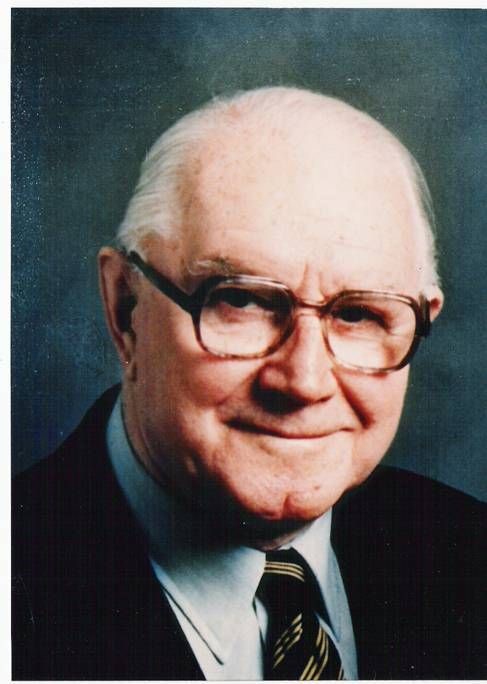
A former President of Rugby Canada, Spray was a critical figure in the development of rugby in Canada until his retirement in 1972.
Originally from England, Spray has held the positions of BC Rugby Chair of Referees, President of BC Rugby, Chair of Rugby Tours Committee of Canada and Director and Vice-President of the Canadian Sports Federation during his illustrious career.
With no governing body at the time, Spray organized tours for 26 clubs, universities and national sides and did the same for five outbound tours including Canadian national team visits to Great Britain in 1962 and Wales in 1971.
Spray was the first president in Rugby Canada’s history, at the time known as the Canadian Rugby Union when re-launched in 1965, and held the position until 1972 when he chose to not stand for re-election.
In 1975, Spray was inducted into the BC Hall of Fame and earned the same honour in 2005 with the BC Rugby Hall of Fame. Spray passed away in 1991 and will be recognized posthumously.
-
Past Annual Awards Recipients
2019 Recipients:
Canadian Shield Winner - Patrick Parfrey, NFLD
Gillian Florence Award - Olivia DeMerchant, NB
Player of the Year – Men’s Fifteens - Matt Heaton, QC
Player of the Year – Women’s Fifteens - Olivia DeMerchant, NB
Player of the Year – Men’s Sevens - Nathan Hirayama, BC
Player of the Year – Women’s Sevens - Britt Benn, ON
Young Player of the Year – Male - Will Percillier, BC
Young Player of the Year – Female - Elizabeth Gibson, ON
Coach of the Year – Male - Aaron McDonald, ON
Coach of the Year – Female - Catherine Laing, AB
Match Official of the Year - Shandra Mosher Gallant, BC
Volunteer of the Year - Ian Maclean, BC
Provincial Union of the Year - Rugby Alberta2018 Recipients:
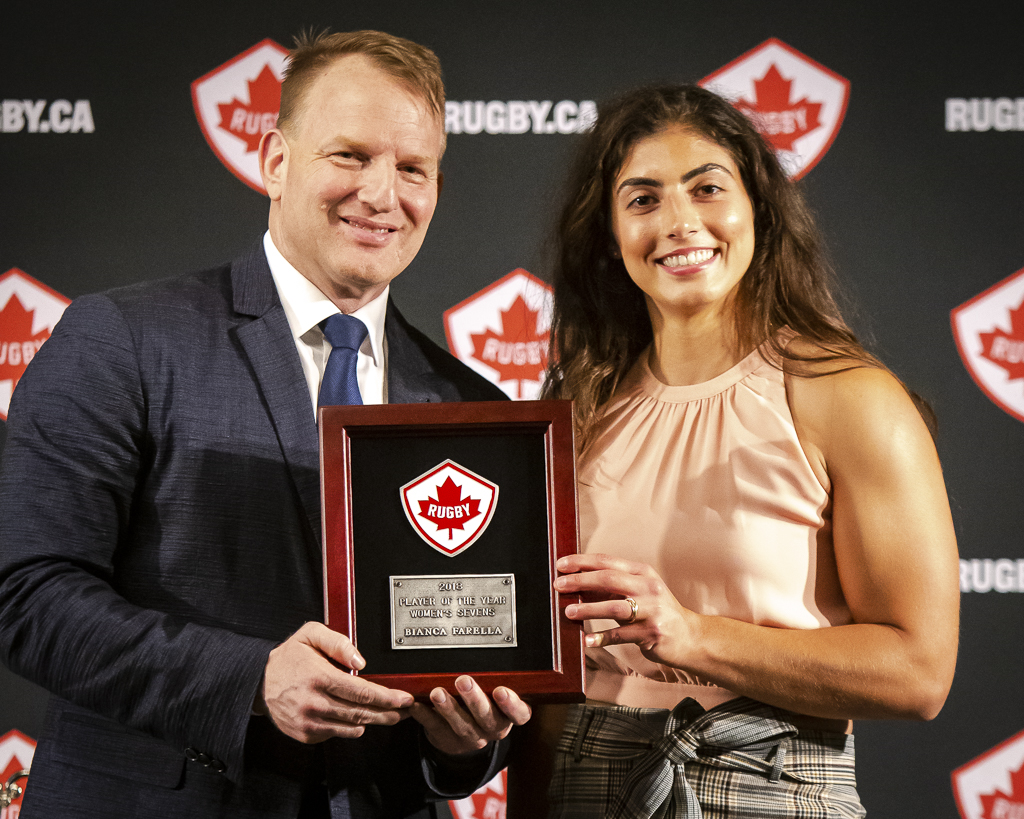
Canadian Shield Winner - Kyle Baillie, PEI
Gillian Florence Award - Laura Russell, ON
Player of the Year – Men’s Fifteens - DTH van der Merwe, BC
Player of the Year – Women’s Fifteens - Janna Slevinsky, AB
Player of the Year – Men’s Sevens - Nathan Hirayama, BC
Player of the Year – Women’s Sevens - Bianca Farella, QC
Young Player of the Year – Male - Brock Webster, ON
Young Player of the Year – Female - Keyara Wardley, AB
Coach of the Year – Male - Kevin Rouet, QC
Coach of the Year – Female - Kailyn Jones, ON
Match Official of the Year - Chris Assmus, BC
Volunteer of the Year - Andrew Davies, ON
Provincial Union of the Year - Rugby Ontario2017 Recipients
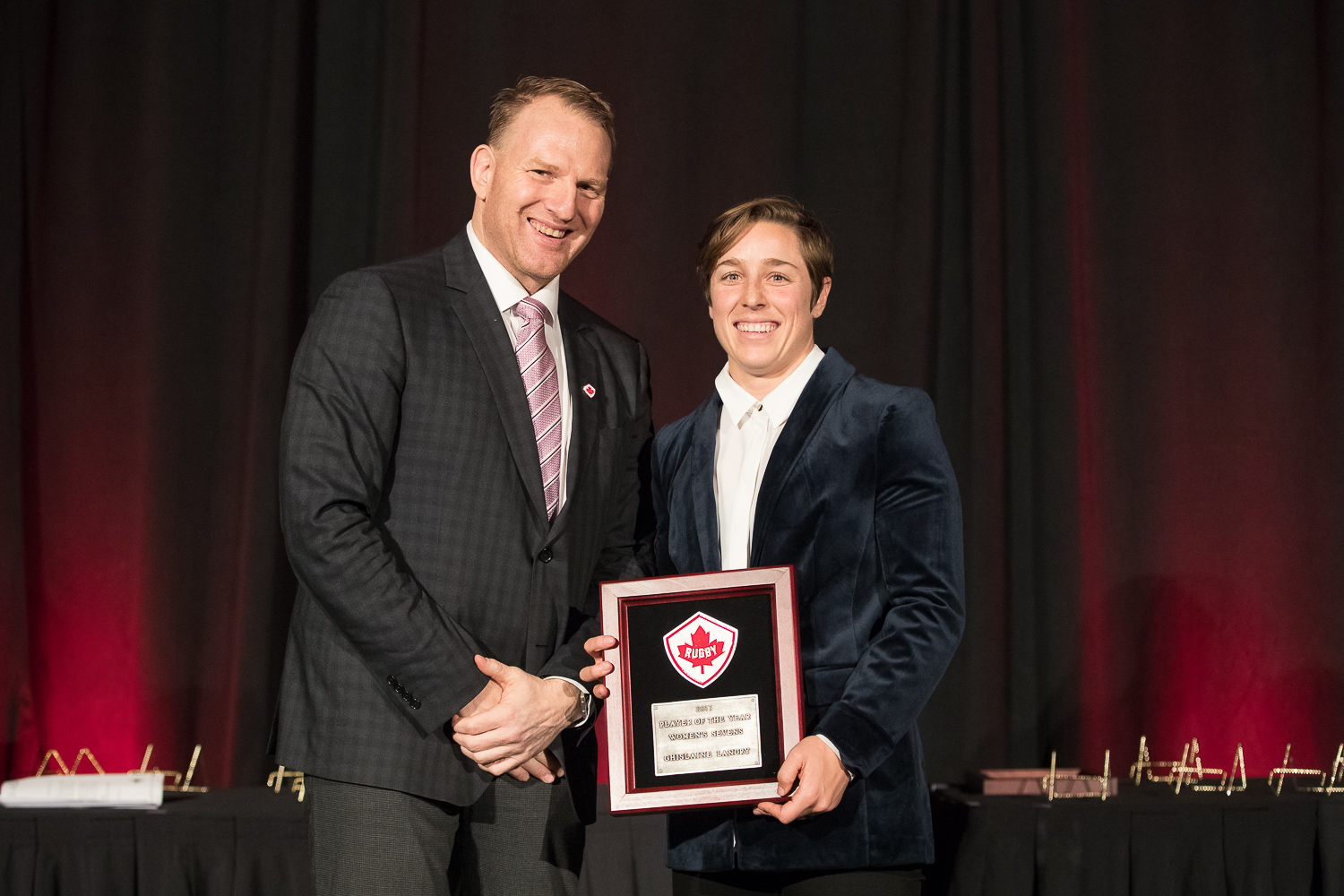
Canadian Shield Award – Taylor Paris
Coach of the Year, Female – Jo Ann Robinson
Volunteer of the Year - Judy Seddon
Coach of the Year, Male – David McCully
Young Player of the Year, Female – Taylor Black
Men’s Sevens Player of the Year – Justin Douglas
Young Player of the Year, Male – Cole Keith
Match Official of the Year – Alan Hudson
President’s Award – Keith Gillam, Richard Powers, Bill Webb, Mayor Stewart
Women’s Sevens Player of the Year – Ghislaine Landry
Men’s Fifteens Player of the Year – Matt Heaton
Women’s Fifteens Player of the Year – Kelly Russell
Provincial Union of the Year – Rugby Nova Scotia
Gillian Florence Award – Kelly Russell2016 Recipients
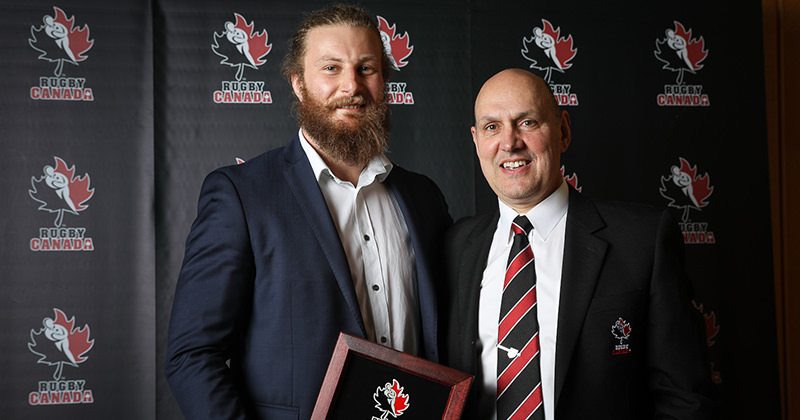
- Canadian Shield Award - Ray Barkwill
- Coach of the Year, Female - Jennifer Boyd
- Volunteer of the Year - Roxanne Butler
- Coach of the Year, Male - John Daggett
- Young Player of the Year, Female - Sophie DeGoede
- Men’s Sevens Player of the Year - Nathan Hirayama
- Special Recognition Award - John Lyall
- Young Player of the Year, Male - Conor Keys
- Match Official of the Year - Rose LaBreche
- President’s Award - Malcolm MacAfee
- Women’s Sevens Player of the Year - Kayla Moleschi
- Men’s Fifteens Player of the Year - Evan Olmstead
- Women’s Fifteens Player of the Year - Laura Russell
- Provincial Union of the Year - Saskatchewan Rugby Union
- Gillian Florence Award - Julianne Zussman
2015 Recipients
- Men’s 7s Player of the Year - John Moonlight
- Women’s 7s Player of the Year - Karen Paquin
- Men’s 15s Player of the Year - DTH van der Merwe
- Women’s 15s Player of the Year - Laura Russell
- Canadian Shield - Jamie Cudmore & DTH van der Merwe
- Gillian Florence Award - Barbara Mervin
- Provincial Union of the Year - Rugby Alberta
- Volunteer of the Year - Rick Romsa
- Match Official of the Year - Rose LaBreche
- Coach of the Year, Male - Graeme Moffat
- Coach of the Year, Female - Anna Wray
- Young Player of Year, Male - Matt Tierney
- Young Player of Year, Female - Caroline Crossley
2014 Recipients
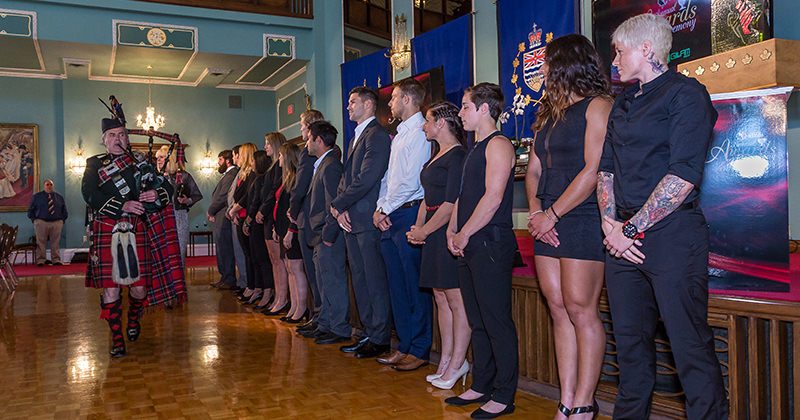
- Men’s 7s Player of the Year - John Moonlight
-
Women’s 7s Player of the Year - Ashley Steacy
-
Men’s 15s Player of the Year - Jeff Hassler
-
Women’s 15s Player of the Year - Kelly Russell & Magali Harvey
-
Canadian Shield - Hubert Buydens
-
Gillian Florence Award - Andrea Burk
-
Volunteer of the Year - Connie McGinley
-
Match Official of the Year - Sherry Trumbull
-
Coach of the Year, Male - Shaun Allen
-
Coach of the Year, Female - Jo Hull
-
Young Player of Year, Male - Lucas Rumball
-
Young Player of Year, Female - Breanne Nicholas
2013 Recipients
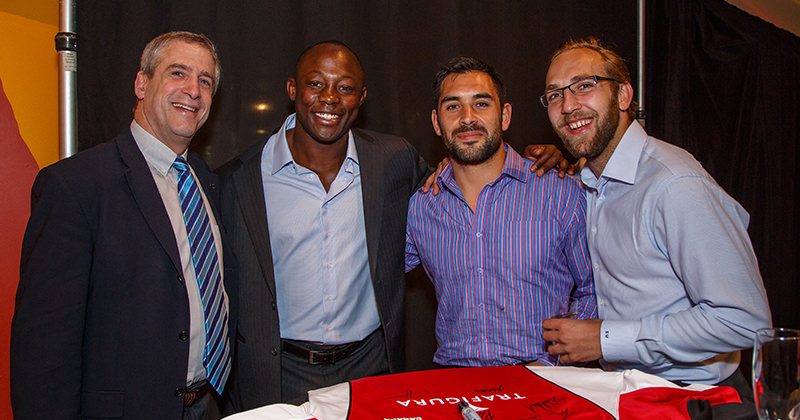
- Men’s 7s Player of the Year - John Moonlight
- Women’s 7s Player of the Year - Jen Kish
- Men’s 15s Player of the Year - Ciaran Hearn
- Women’s 15s Player of the Year - Kelly Russell
- Canadian Shield - Phil Mack
- Provincial Union of the Year - British Columbia Rugby Union
- Volunteer of the Year - Mark Winokur
- Match Official of the Year - Bruce Kuklinski
- Coach of the Year, Male - Michel Francois
- Coach of the Year, Female - Stephanie Murphy
- Young Player of Year, Male - Patrick Kay
- Young Player of Year, Female - DaLeaka Menin
2012 Recipients
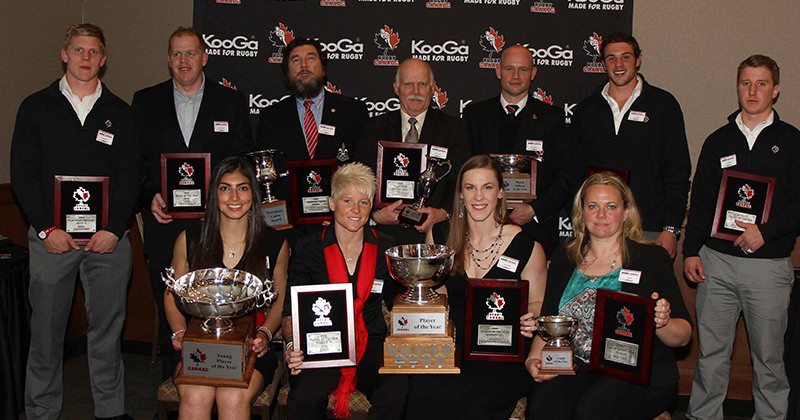
- Men’s 7s Player of the Year - John Moonlight
- Women’s 7s Player of the Year - Jen Kish
- Men’s 15s Player of the Year - Tyler Ardron
- Women’s 15s Player of the Year - Maria Samson
- Canadian Shield - Hubert Buydens
- Provincial Union of the Year - Federation de Rugby du Quebec
- Volunteer of the Year - Dean Kittleson
- Match Official of the Year - Andrew McMaster
- Coach of the Year, Male - Chris Silverthorn
- Coach of the Year, Female - Jen Ross
- Young Player of Year, Male - Lucas Hammond
- Young Player of Year, Female - Bianca Farella
-
Canadian Rugby Foundation
The Canadian Rugby Foundation was established in 2003 as a public foundation and registered charity with the mandate of building encouraging and building funds used to support the growth of rugby in Canada. Among its over 75 funds are funds dedicated to supporting Rugby Canada’s age-grade and senior teams and programs, as well as funds providing annual awards to Canadian players, coaches and administrators. More information can be found here.